#that does not actually achieve anything nor is there any logical reasoning behind this however
Explore tagged Tumblr posts
Text
fear
#that does not actually achieve anything nor is there any logical reasoning behind this however#it is merely there. the underlying borderline paranoia.#every person has a limited amount of time per dayit is their choice and their choice alone on what to spend it on#i spend my time fearing uncertaincy. how original and productive#vagueposting while doing english homework i am so proud of myself.#'interact with people more' my teacher says. she does not understand that#being alone and thinking thoughts =not tiring and social interaction= draining.#on occasion isolation is a very crucial human need#i assume talking would help but hmm :D no. communicating is for the weak#SLASH J IM THE ONE WHO IS WEAK#so glad there is no school tmr....... time and silence and lack of chinese remedial......... dream life#oh and updates about cat cactus' fluster when interacting with (name). free entertainment
1 note
·
View note
Note
Hi, I hope you're doing well and staying healthy. I've read your post about how Elizabeth attacking ciel is sexism. What about Sebastian getting bully by Frances? Frances is a noblewoman grabbing a servant's hair in front of other people. And fans (including me) are like: oh! What a lioness! Even the devil himself is terrified of her! what if it was the other way around? The idea of a nobleman grabbing a governess's hair calling her nasty and indecent makes me uncomfortable and even angry.
【Response to post: Sexism against men and Kuro Sexist jokes】
Dear Anon,
I’m doing well, thank you very much. I hope you too ^^
Your question is a very good one, and it really had me thinking for a while! I myself admittedly do laugh very hard at Sebastian getting a hard time from Frances. But indeed, like you said, it is still bullying, and bullying is bad. In this post-feminist era, we have been so trained to see women bullying men as ‘funny’ or ‘empowering’, but women getting bullied as unambiguously bad instinctively, that sometimes we forget to check our double standards.
Feelings are feelings, we can’t help what we feel. But how come then that to many of us, Frances bullying Sebas is so funny, but Lizzie almost murdering O!Ciel and Nina bullying men not? This post is merely an attempt to explain this feeling for myself too, but hopefully we can all reach SOME explanation together as well???
Let us first look at in what ways Frances has been making Sebastian’s life hard. From all the interactions we have of these two so far, her main points of criticism seem to be his hair and his lack of professionalism.
Slovenly Hair
Sebastian’s hair is something we’ve gotten quite used to now after more than14 years. In Sebastian’s time however, his hair really would have been the height of impropriety for his profession.

Just like I translated O!Ciel’s looks to 2020 standards, I quickly translated Sebas’ hair to 2020 standards as well. Very clean, innit?! Very professional, innit?!
Even without the translation however, if we look at the worst of wigs from the Kuromyus, we can also see how Sebastian’s hair would be atrocious in any formal setting. Look past the fact that these actors are supposed to represent a drawn character. Just imagine being in a fancy restaurant and encountering a dead-spider feather duster on your waiter’s head.... erm....???
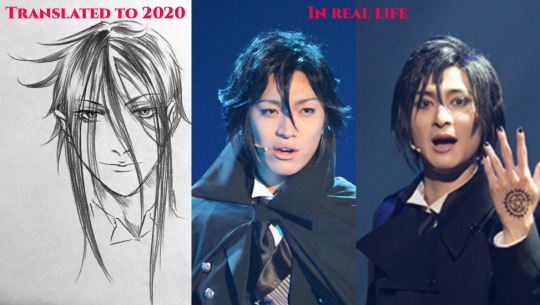
Something that is objectively bad on Frances’ end however, is that chapter 14 is not the first time that Frances has seen his ‘slovenly hair’. If his hair really is so unacceptable, as an authority figure Frances has the right to say something about it. However, as it seems, until this point she has never communicated at all (no, “hinting” is not the same as communicating), so Sebas had no way of knowing what he “did wrong”. She immediately grabbed for Sebastian’s hair without mercy, probably because her crept up frustration got the better of her. This is indeed entirely too harsh for a first time call-out, and entirely on Frances.
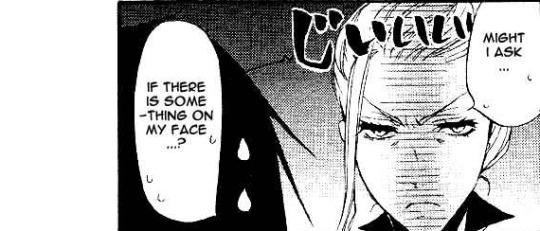
Much later in the story Frances criticises and touches Sebastian’s hair again, and this time in public while he was infiltrating as a teacher. Here Frances is even publically humiliating Sebastian in front of his students and other high ranking guests.

Especially when you keep in mind that Frances is a noblewoman and Sebas a mere servant, Frances is indeed abusing her power against a servant who cannot strike back at all.
This is indeed power play. However, though it does not justify anything, in the very least her criticism does have ground; Sebas’ hair is by all measures inadequate for any professional setting. Just be nicer about it, Frances.
Useless Butler
Now, let us look at the other reason Frances disapproves of Sebas. Sebastian is a very competent butler according to most people. To Frances however, this claim is empty. When she arrives, parts of the estate have been destroyed and something very literally exploded in her presence.
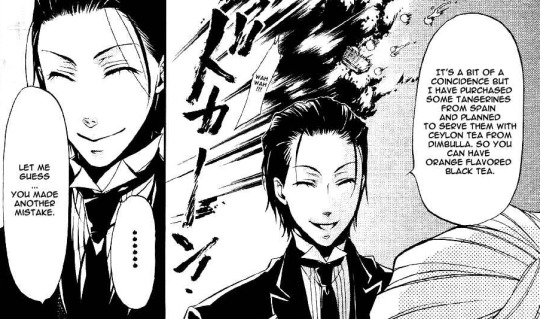
Even though Sebas is not the person actively causing the explosion or the destruction, as the senior servant of the household, it is literally his job to manage the other servants. So yes, here too, the fact that things can be destroyed in the household because he either hired inadequate staff or because he mismanages his household, DOES INDEED prove he fails at his job. As the aunt of O!Ciel who cares about her nephew AND her paternal home, Frances is in her right to be concerned and call Sebastian out for NOT doing his job.
In chapter 14, Sebastian’s schedule was all over the place and kept changing the plans for Frances. It is no wonder that she would be quite annoyed and doubt Sebastian’s adequateness. When you know your 13 year old nephew’s household is in the hands of somebody so apparently inadequate, anybody would probably be concerned. However annoyed though, Frances does not overstep any boundaries about this specific issue; she is simply supremely unimpressed. Fair enough?
Compliments where due
Something that is quite interesting though, is that despite disapproving of Sebastian, Frances does also know when to compliment him when due. After Sebastian has saved Lizzie’s life without boasting, Frances recognised how the butler does indeed have some value and the correct attitude as a servant.
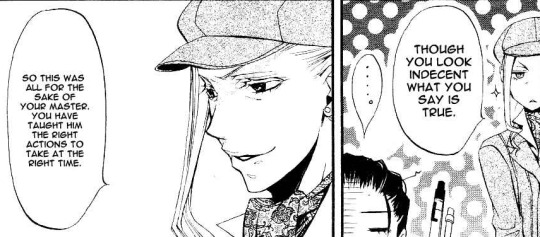
She says “though you look indecent what you say is true,” and it is yet another jab at the demon’s expense. But here she is also showing that she is willing to acknowledge somebody’s achievements, looking past appearances.
Before Frances leaves, Frances jabs at Sebas a bit again, but she really is not doing anything dickish this time. Instead of making Sebas think she’s simply chosen him as target to be a prick towards, she concretely states why she doubts his professionalism. She mentions the smashed tea set, bare garden and burnt food; mistakes that are objectively unacceptable. Instead of yelling at him, she actually gives him constructive criticism. So here too, Frances is quite stern, but her grounds are solid.

In the Campania arc Sebas shows up again with the hair Frances disapproved of. Frances clearly wants to do something about it again because in her eyes, the butler simply won’t learn. But given the circumstances and Sebastian’s proven usefulness, Frances actually does shelve her agenda. Just like above, here too Frances shows that she is capable of acknowledging somebody despite their looks.
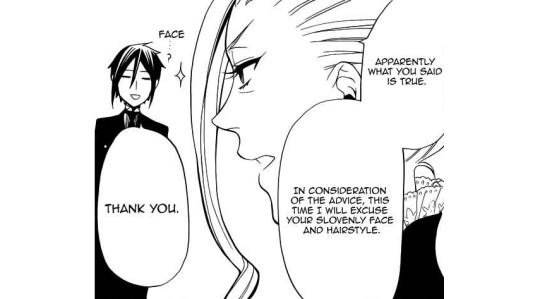
Later when the zombies dramatically outnumbered the living humans, Frances sends Sebas - who had come to her aid - back to her daughter and nephew. By sending Sebas back, Frances also shows that she in fact trusts this ‘slovenly butler’ with the lives of two children she loves deeply. Sebastian protests, but Frances immediately replies: “don’t you trust our ability as swordsmen?” Here what Frances is functionally saying is: “I trust you with your abilities, so you can trust us back.”
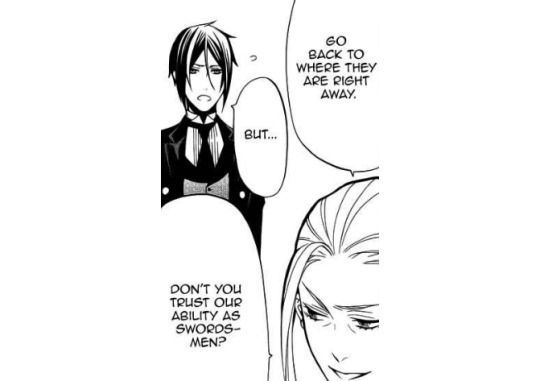
In short, Frances is harsh and doing power-play against a servant, but she can shelve her agenda, and does acknowledge Sebas when due.
Contrast to Nina and Lizzie
So now we have seen how Frances bullies Sebastian, and her motivation behind all her points of harshness. As we have seen, Frances’ only points of criticisms are concrete ones; Sebastian’s lack of professionalism in looks, and his lack of professionalism in management. She goes about them too harshly, but all points are legit criticisms, and something Sebas CAN and probably SHOULD work to improve.
Nina

This is in stark contrast with the way Nina bullies her victims. As far as we have seen, none of Nina’s victims have offended her in any way, nor does she ever give any concrete criticism. She has just decided that because men are men, they don’t deserve proper treatment. Even when providing clothes for men is literally part her job, she refuses to provide the ‘professional service’ she is being paid for. And because she is AN EMANCIPATED LESBIAN!!!!!!! #FEMINISM, it’s FINE (!?!?!?)
Unlike with Frances’ criticism of Sebastian’s inadequate hairdo and managing, being ‘men’ is not something any of these men can do anything about (except Sebas, but Nina doesn’t know). Bullying is always wrong, always low. But it’s EVEN lower when you bully somebody for who they are, and not what they do wrong. What does not help is that Nina seems to only be capable of treating people nicely if they happen to be sexuality-wise compatible with her... but if you are, you’ll get molested. What is wrong with you, Nina????

Yes, Frances is saying: “you are a man, and yet your fringe is so long”. So on the most surface level, it is a woman saying this to a man because he is a man. As we later get to know Frances a bit better though, she would be harsh to anybody who looks slovenly. She just has different hairstyles which she considers appropriate for men and women respectively. Had Sebas been a woman and his hair was the ‘feminine equivalent of slovenly’, Frances would most likely have acted exactly the same. So in this sense, unlike with the jokes using Nina and Lizzie, it is not purely: “Haha, girl bullies boii, lol.”

Something else that is terrible is that what Nina does seems to be systemic. Logically it checks out too; it can’t be that only since the past few weeks she’s decided only women and young boys deserve her kind treatment. For all we know, Nina’s been treating the male Phantomhive staff like this for 2-3 years. Sebastian’s comment about Nina thoroughly ignoring men again with “as always” further supports this theory.

With Frances in contrast, in chapter 14 (so barely a year ago in story time), Sebas seemed to have no clue whatsoever about Frances’ terrors. Sebas announced Frances’ arrival to his master and is very calm about it. It was not until O!Ciel alerted Sebas about his aunt that anybody even guessed what hurricane was headed for them. As such, we can safely conclude that Sebas had only been subjected to Frances’ criticism a couple of times, unlike having had to bear with Nina for years.
Yes, Frances still should have communicated, but I already addressed the details above. Still, the point remains that even though Frances is overstepping boundaries and abusing her power, her criticisms are at least not empty.
Lizzie
Lizzie too just like Nina, had zero grounds for showing that much aggression. She did not give anybody the benefit of the doubt, did not communicate, or even so much as give O!Ciel any chance to explain the situation. So far O!Ciel has given Lizzie no reason to think he’d cheat on her, and yet she hurled so much aggression at him Sebas had to intervene.

Still, Lizzie is marginally better than Nina because she is not systemically bullying O!Ciel. It is a one time event. However, this one makes me more annoyed with Yana because it means that even Yana had to use this stale, stale trope of “LOVE TRIANGLE COMEDYYYY”. Have I ever mentioned how MUCH I hate love triangles and jealousy???
Conclusion
Feeling wise, the most important reason for why Sebas being bullied by Frances is funny is probably because of who Sebas is. Sebas is otherwise an all-powerful demon, but to see him inventing colours to shit at Frances - a human Sebas could crush between his fingertips like a cookie - is just hilarious. Had Sebas been a human though, I would not have laughed so hard personally.
Rationally however, Frances is doing power play against a servant who cannot talk back, so it is still bullying, and bullying is inexcusable.The only bit of “right��� Frances has is that she does not seem to be systemically bullying Sebastian, and that her criticisms have some ground.
So if Nina and Lizzie’s behaviours played for jokes are like... a -7 and -9 respectively, Frances’ at least scores a -2 for me?
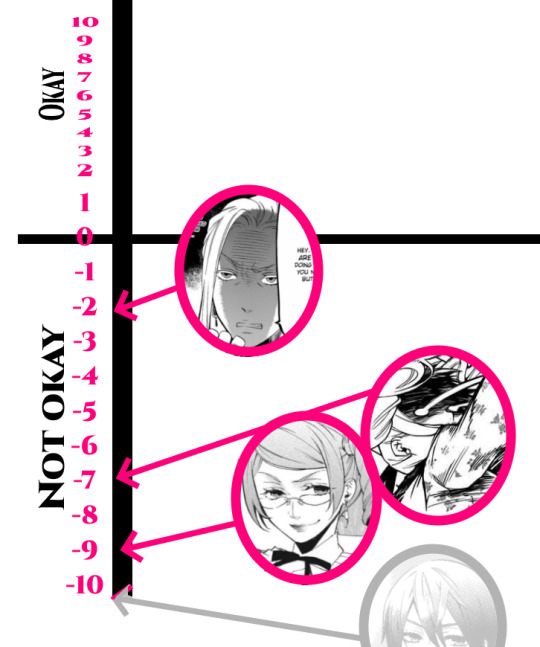
(Yes, as we’re talking about bullying anyway, I just have to make a jab at Vincent.)
Afterword
Something not really related to why “Frances:Bad”, “Nina-Lizzie:Worse”, but I do wish to mention is Yana’s improved drawing skills. I have no proof, but I think it MIGHT have been where this Frances-joke originated.
Yana’s time in the more traditional mindset of manga-worldview really showed, especially at the far beginning. Besides, she was still in the process of finding a way to draw handsome men. In the more traditional mindset of the early 2000s, handsome men were just not supposed to have slicked back hair - “that was reserved for old men and nasty dudes!!” Yana’s discomfort with drawing handsome men with slicked back hair was clearly visible in Sebastian’s early appearances, and making the ‘”hair, back!!! says old-fashioned lady” was potentially even a way of Yana to laugh at herself.
I don’t know who else is old like me and grew up with 80s to early 00s manga, but at the time, hair for handsome men was a BIG deal. In that world ‘slicked back hair’ just carried a certain laughability about it; a “rule of not-cool”. To me at least at the time this ‘laughability’ really resonated with me, and Yana probably also trusted this same ‘unspoken rule’ to resonate with her audiences.
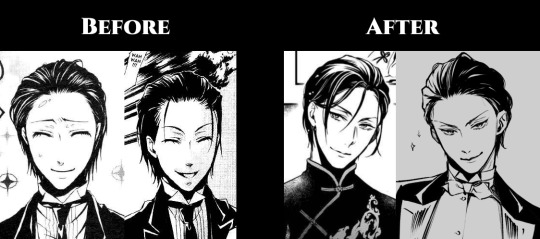
Much later though, Yana clearly grew more comfortable and maybe even fond of slicked back hairstyles as she confidently chose to portray Sebas as ‘appealing’ while wearing his hair in the style Yana previously disliked.
Again, I have no proof, but I can’t help but think that if Kuro had started 10 years later, the running gag revolving Frances might look altogether different.
What do you guys think? ^^ Cheers, and stay healthy!

Character analysis Nina Hopkins
Character analysis Vincent Phantomhive
Sexism against men and Kuro’s sexist jokes
MASTERPOST Gender in Kuroshitsuji
MASTERPOST Analyses & Info
#Kuroshitsuji#Frances#Midford#Sebastian Michaelis#hair#joke#funny#tw bullying mention#Lizzie#Nina Hopkins
203 notes
·
View notes
Text
Tangled Salt Marathon - Rapunzeltopia

This episode, much like many other plot important episodes of the first two seasons, is decent on it its own, but becomes retroactively worse due to season three’s bad writing and behind the scenes bullshit.
Summary: Matthews reveals himself as another dark spirit and disciple of Zhan Tiri, and traps Eugene, Lance and the others in unbreakable vines similar to the Great Tree's evil magic. He has Rapunzel live the perfect life while he prepares to hand over the mystical powers of the Sundrop to his master. Fortunately, Rapunzel is able to make contact with her brown-haired dream self and attempts to convince her to let go.
Timeline Alert
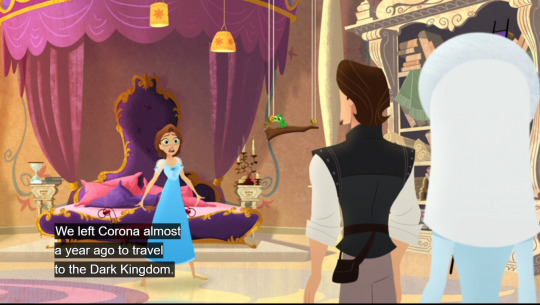
So what does almost a year ago mean? The Great Tree was six months out, and then in Mirror, Mirror, Lance said that they been fighting for three weeks since. So how long have then been stuck in this shell house? Because You’re Kidding Me was just the next day after Mirror, Mirror. Was Lance’s ‘three weeks’ comment meant to be after Brothers Hooks and Rapunzel: Day One and not Great Tree? Are we 7, 8, 9, or 10 months out from Secret of the Sundrop? Like be clear about your time frame guys if you’re going to use it as a plot point.
I’m going to say we are 9 months along on this trip, just cause that sounds closer to ‘almost a year ago’ without keeping them all trapped in the shell house for months. So Great Tree is 6 months, Brother’s Hook and Rapunzel Day One is 7 months, Mirror, Mirror is going on 8 months, and at the end of this episode they’ll be heading into the 9 month period...I guess. Lets just say they were trapped there for a week or two.
This Episode Only Highlights How Self Centered and Immature Rapunzel Still Is Rather Than Showcase How Much She’s Grown

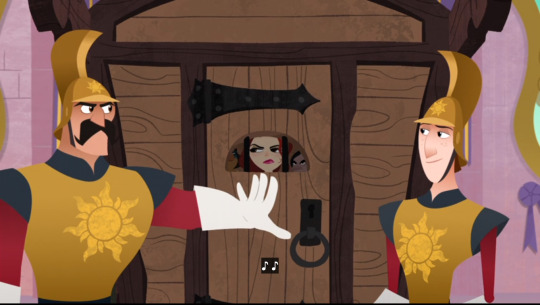
The point behind this episode is show how much Rapunzel has grown since season one, and how she is accepting of responsibility now, but it actually backfires because she’s not actually being challenged on her selfish desires but on her lack of agency. Which is the wrong lesson that she needs to be learning at this point in her development.
Rapunzel in her subconscious mind doesn’t wish for what’s best for other people but what’s best for herself. People she must interact with on the regular have to be superficially happy even if it completely warps their character. While people she doesn't care about, like Lady Caine, can just be simply banished and ignored regardless if they deserve such an end or not. She doesn’t see people as people with individual thoughts and feelings, but as satellites to herself and her narrow worldview.
Also, ‘I believe everyone deserves a second chance’ my eye! Caine never gets even a first chance in Rapunzel’s own fantasy world. Because Rapunzel is a selfish hypocrite who’s ‘redemptions’ always comes with strings attached.
Here Comes the Dumbest Plot Point In the Show
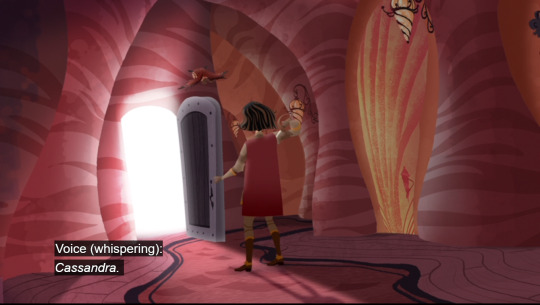
I’ll talk about this more when we get to season three, but this scene is the beginning of the end for any dignity the show once held.
Also why would ‘I don’t trust anyone’ Cassandra follow a creepy voice calling her name through a doorway inside a magic house that’s tried to kill her twice now?
If you gotta make you character act out of character in order to get your plot rolling than you haven’t a good plot. Think of something else.
What’s the Point of Having Two Names?

They did this both with Sugarbee and Matthews here and it makes zero sense. Why would they need to bother with fake names if the heroes wouldn’t even recognize their real names to begin with? Such revelations add nothing and fails to tell the audience anything new about the characters. It’s also not consistent as it turns out Gothel was a disciple too and she only gets one name, so what gives?
So How Does This All Work Again?
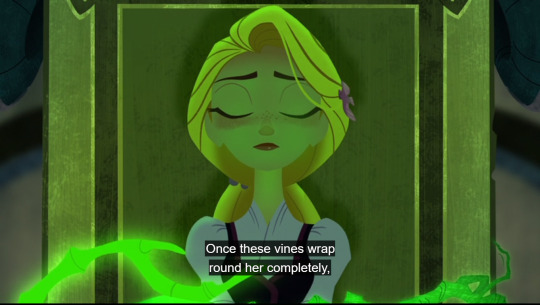

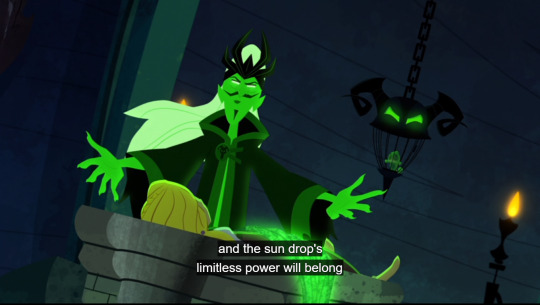
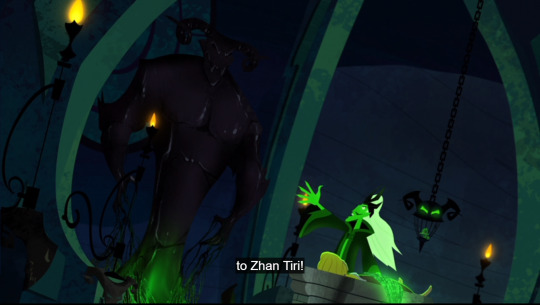
So Zhan Tiri needs ‘a clash of the sundrop and moonstone’ in order to be freed from her prison. Why? I don’t know, but holding Rapunzel prisoner for life actually undermines that plan, and it’s a plan that Zhan Tiri is currently setting up with Cassandra off screen during all of this.
So does Tromus/Matthews just not know that Zhan Tiri is already ‘free’ and has her own plans?
Is Rapunzel’s power being drained what gives Zhan Tiri a foothold in the real world?
Or was Zhan Tiri released back in the Great Tree with the removal of the spear and that’s why she knows to go after Cass?
What was up with the Great Tree and the sealed tree back in Painter’s Block? Did they have any impact on Zhan Tiri’s plans?
Were any of the disciples actually useful at all?
So What Do the Disciples Gain From All This?
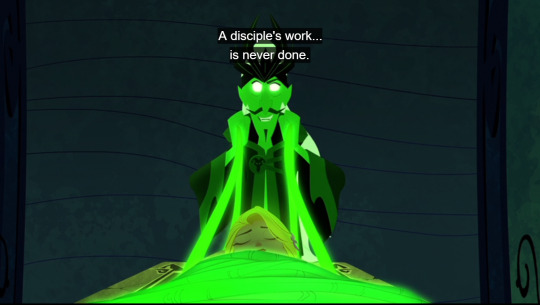
Sugarbee, Matthews, and Gothel were all once real people who actually lived so what are their reasons for following Zhan Tiri? What do they gain from going through such complicated plans? Why continue to follow someone after you’ve been dead for centuries and are a ghost now, and were presumably trapped and or killed by Demantius for following her? Real people don’t just hold on to such fanatical devotion without reason.
This Conflict Over Choices Does Not Work Without Varian

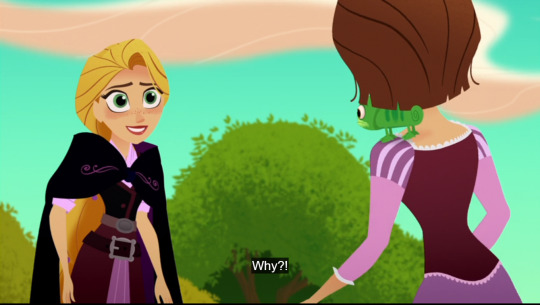
Going back to how this episode fails to develop Rapunzel; it wants to have Rapunzel take responsibility for difficult choices, but much like Painters Block, it completely ignores her biggest fuck up thereby undermining why she has trouble with owning up to hard choices.
Rapunzel ruined a child’s life. She may not have meant to but she did, and thus far she has done nothing to make amends for it. She’s not even spared the poor boy a single thought beyond seeing him as the boogeyman in a nightmare once.
You can’t have Rapunzel take responsibility for anything if you won’t hold her accountable for anything.
Varian was meant to appear in this episode, and indeed he should have for the above reason.

But of course Chris had to give us a bullshit excuse for why he cut the most plot important character from the series.

I’ve already spoken about how Varian’s cameo in Happiness Is did nothing to actually further develop Rapunzel nor explore her guilt back in that review. In this episode, however, I want to discuss how hollow the comparisons to Gothel is and why there shouldn’t logically have been any competition between the two.
Varian and Gothel provide two completely different conflicts and two completely different points of development for Rapunzel’s arc. Gothel is the instigator of her conflict with Rapunzel. Rapunzel, as the victim, has only one thing to learn, self esteem. She learned it back in the movie, she relearned it back in the season one, and here she’s re-contextualizing it for this episode’s mini-arc.
Meanwhile Rapunzel is the instigator of her conflict with Varian. She’s the one with the power in their relationship and her choices matter. She doesn’t need to learn agency because she already has it. What she needs to learn is responsibility and she can’t do that without confronting Varian and what she did in some manner. So unlike with Gothel there only new ground to cover here rather than rehashing old conflicts.
Chris Sonnenburg has things all backwards. Rapunzel’s agency/self-esteem issues and her need to take responsibility for her actions are not interchangeable conflicts. Addressing one does not automatically address the other, and of the two her conflict with responsibility holds more weight because it’s ongoing. We haven’t seen the resolvement there. It also affects more people than just herself so the stakes are higher there as well. And to top it all off, it fits with the themes of the episode better.
Also, you very much could have had both characters because they both reflect different conflicts and serve different purposes in the narrative. Time management in television is a very big deal yes, but you have little grounds for defense when all you’ve shown is how poorly you’ve managed your time until now.
In short, Chris is full of shit.
No, It Wouldn’t

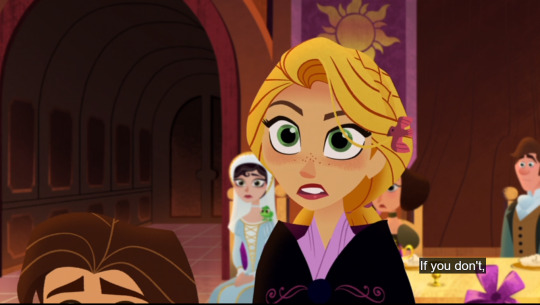
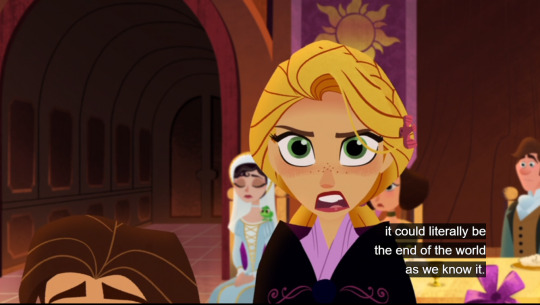
We’ve already established that there’s no need for Rapunzel to go on her quest in season two. The black rocks are inactive, there’s no ticking clock she has to beat, and her staying at home would have actually prevented the conflicts in season three.
Unless dream Rapunzel is referring to Zhan Tiri being released, but even that is false because Zhan Tiri is already floating around a little blue ghost girl off screen right now. What Rapunzel choses or chooses not to do does not change that.
Lack of external conflict undermines internal conflict.
Just Cause You Make A Meta Joke About Your Heroes Being Dumb For No Reason, Does Not Make Them Any Less Stupid
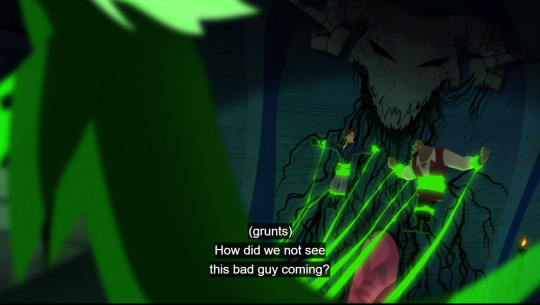

Jokingly admitting a fault in your writing doesn’t not excuse that fault. If you can’t have a plot without handing the idiot ball to your characters than you haven’t a good plot. Time to go back to drawing board.
Season Three Will Go Back On This Episode’s Message and Prove the Villian Right
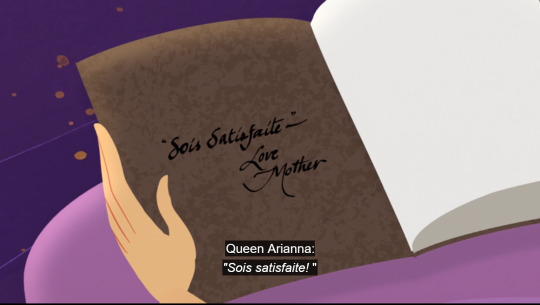
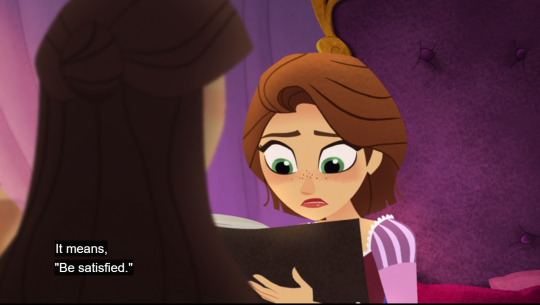
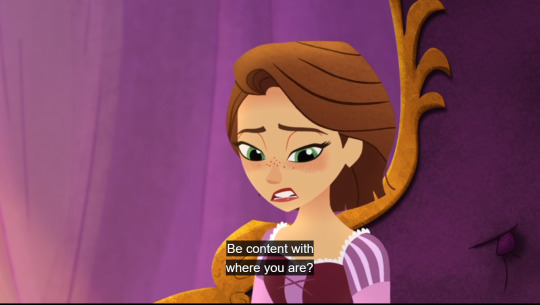

I’ve liget seen fans unironically praise the show for it’s message of ‘be content with what you have’. Not only is that a terrible lesson to teach children; it’s actually the exact opposite of what the show is trying to achieve.
“Be satisfied” is suppose to be the wrong motto. Rapunzel is suppose to be fighting against this message. In the episode itself it’s the villian who is saying such things in order to tempt her to stay put.
So how could anyone look at the show as a whole and come away with idea that the one off villain was right along?
Because season three does a complete 180 away from its original messages regarding agency and responsibility. All consequences disappear from the story and the mains are given convenient scapegoats to distract from their decisions. Characters actively regress and are rewarded by the narrative for either not doing anything or for victim blaming others for their actions.
But most damaging of all is the fact that nearly everyone winds up back where they started out at, or aren’t given a proper ending at all. Tangled’s story is just one giant circle and that in of itself contradicts the idea of progress.
Cassandra’s Hurt Hand Is Only Relevant When The Story Wants Rapunzel to Feel Guilty About Something


Oh but we can just throw Cassandra’s burnt hand in here as a substitute Rapunzel’s guilt over Varian. Even though the two incidents should actually complement one another rather than compete for dominance.
Tangled doesn’t trust its audience to remember things. It acts like if it’s off screen or not being focused upon than it’s not happening or isn’t relevant. This undermines any ongoing or overarching conflicts.
Why should we care about Cassandra’s arm if she’s been shown as being fine with it for four episodes by now? Especially since it’ll never come up again after this point? And on the flip side of things, why should the audience not care about the 15 year old who has been sitting in a dungeon for almost a year now due to Rapunzel’s neglect?
We’re not magpies who are quickly distracted by shiny new things. We are capable of retaining information and informing decisions based off of that. Especially if Chris was shooting for the teen audience as he claims he was.
Oh But We Got Time For Godzilla-Pascal

Can’t spare even half a minute for a Varian cameo that would be relevant, but we sure got time to waste on a pointless action sequence that does nothing to further the character in what is meant to be a character development episode.
This Scene Is Out of Character


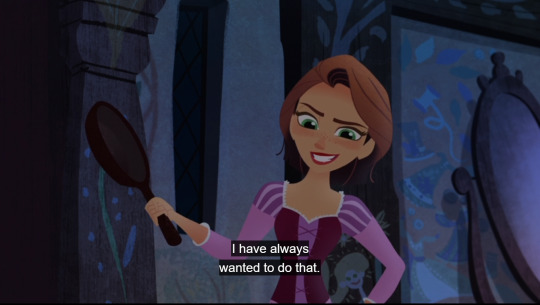
That’s not how abuse works!
The whole reason why Gothel was able to keep Rapunzel under her thumb for 18 years because Rapunzel always sought her approval. Never at any point, even when finally choosing to break away from her in the movie, did Rapunzel wish to harm the woman. That goes against who she is as a character and it’s not how abuse victims respond to abusers even after cutting things off with them.
If anything, Rapunzel’s treatment of Frederic in Happiness Is is more in line with how a victim goes about mourning the loss of an abusive relationship. Victims grieve for what might have been. Victims mourn the loss of what good times they had with their abusers, because yes, abusers aren’t abusive 100% of the time 24/7. They can’t be or they risk losing their victim quicker.
I initially was ok with flashbacks to Gothel on occasion because no victim ever makes a completely clean break from their abuser. Even ‘moving on’ isn’t some triumphant singular action when you stand tall while you knock your opponent down in a wish fulfilment fantasy.
No. ‘Moving on’ is slow. It’s understated. It’s routine. It’s about being able to do the dishes without getting triggered. It’s sitting at lunch with friends and being happy and calm without the fear of returning home hanging over your head. It’s not skipping out on work because your anxiety is through the roof over just meeting with your boss. It’s not devolving into a yelling match over something minor because you internalize your abusers behavior.
Abuse victims don’t celebrate violence as strength. We celebrate being an unmovable mountain of clam fortitude. Being in control even as the world rages at us, because we’re self assured.
The fact that this scene exists, while Happiness Is shows Rapunzel behaving the opposite way to the father who abused her the same as Gothel did, only proves that a man shouldn’t have been in charge of this show. Certainly not without a woman by his side giving equal input.
Stop Using Destiny as a Shorthand for Everything!
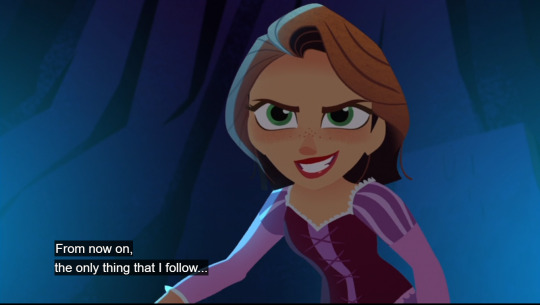
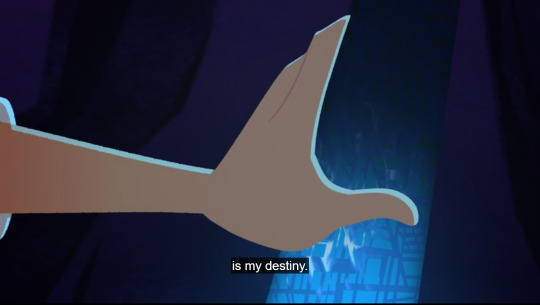

Destiny isn’t a catch all word that can mean whatever you want it to. Words have definitions for a reason. Destiny isn’t a goal nor does it equate to agency and responsibility; kind of the opposite in fact.
Well That Was Redundant

All we did was rehash Rapunzel’s season one arc in under half in hour. Nothing new was learned. It’s like writers don’t know how to resolve any conflict that isn’t a repeat of the first movie. Meanwhile actual unique conflicts are just sitting off to the side being ignored. All because the show’s creator doesn’t want to hold his precious self insert accountable for anything.
Bye Bye Smart Cass, Hello Dumb Cass
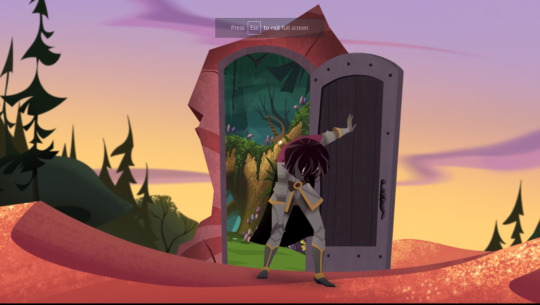
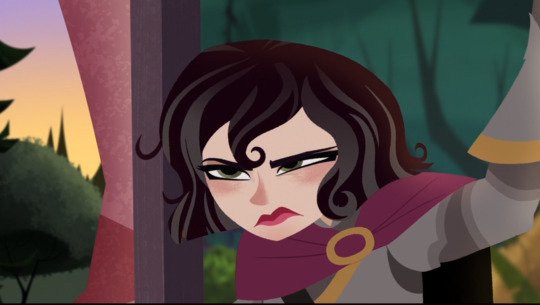
So from this point onward the Cass we’ve known for nearly two seasons is gone. She’s just been replaced by the dumbest bitch on the planet. Because the writers don’t understand how manipulation and trauma actually works. Nor do they comprehend the importance of giving characters actual goals.
Conclusion
Season three is what retroactively spoils this episode. Cass’s dumb decision here, Zhan Tiri’s lack of a coherent plan, the uselessness of the disciples, and even the lack of Varian could have been glossed over had they writers given us a satisfying pay offs for any of the main conflicts. But they didn’t and so here we are.
Also a small update, but after this review and starting next week, the Salt Marathon will go from bi weekly updates to only one a week. This is a combination of real life work getting in the way and the growing length of the reviews. This means we’ll hopefully be done come March, which would mark the show’s anniversary. I got some plans to celebrate if that works out.
80 notes
·
View notes
Note
fellow fruba friend here! What are your expectations on what each of the four main characters will achieve or gain at the end?
hi fellow furuba friend! by the main four, I suppose you mean yuki, kyo , tohru & shigure! All the traumatized characters in furuba deserve all the best & everything good given to them. They are all genuinely broken souls & I love them all. However, not everybody will actually be given everything for realistic reasons.
(1)-I’ll start with the easiest: Yuki. Yuki’s wish was stated so early in SE01, ep12 & ever since things have been moving so straight forward towards his goal: discovering his own self, finding friends who accept him w/o a mask & finding love. As Se02 is heavily focused on him, he got all that & more. it is very clear that the writer has decided that Yuki is the character that will get everything:
He opened his lid, faced akito & his fears & started laughing more.
He is shedding his mask & the prince persona.
He realized his familial feelings to tohru.
He accepts & supports tohru/kyo as couple & doesn’t feel envy/sadness.
He faced his mother calmly & decided his future. Altho he doesn’t need her any more, it is clear that he is civil with her & doesn’t blame her. She thinks of him as a tool that helps her glows & I’m sure she views his success as part of her & in the future, she’ll proudly say that’s my son if he was brought as a topic in any social gathering. My point is, given yuki’s stance to forgive the past, he won’t cut ties with her.
He completely forgiven his brother & is proud of him publicly.
He got a friend who is a mix of the two person yuki envies the most : kyo & aya. Also, kakeru is very designed to fit yuki in every way, so even if yuki never got anymore friends, kakeru is the one for life.
Altho yuki’s story could still be good without romantic love in canon as it can be hinted as sth he’ll get once he’s in college, he is getting a romantic love now with someone who doesn’t pity him nor admires him, sees the real him. Someone whom yuki can be a “tohru” to her & “support” her & be a “kyo” to her in the same way he’s been observing kyo & envying him for being the only one to see the real tohru. Yuki will be the only one to see the real machi.
What more can I say...What more can the writer give yuki.. I’ve been thinking hard... but I duno...perhaps sth to do with kyo & their views of each other.
I’ll leave number #10 open cuz I’m sure there’s more the writer will give him..but I duno regarding which character...um... shigure? The writer has been impersonating yuki so much in Se02 & giving us direct lessons thro his voice as much as I wish she tones it down as this disrupts the flow of a story, making yuki speaks on behalf of other characters whose voice has been blocked, it also doesn’t trust the viewers/readers to “learn the lesson” without directly given to them. So I’m positive 100% there will be more yuki telling us learned lessons us especially after critical moments similar to some of SE02 big eps.
(2)-Kyo: Kyo is always given one ep of inner thoughts per season. However, each ep is big & so influential for both his character development & the story’s plot as a whole. His thoughts were essentially blocked at first for mystery reasons due to his involvement with kyoko but ever since Se02, ep9 it was exposed that he knows her, it’s now blocked for building the “climax” reasons. However, the writer is skilled in writing kyo as a character that is easily read, someone who doesn’t know how to act, so you can decipher his feelings from his actions. I don’t mind him not giving inner thoughts if his actions can replace that & communicate his feelingsto the viewers which is so well-done with kyo but badly done with tohru,(but more on tohru later). what I expect for kyo... it is hard to say!!! It depends on how the writer will solve kyoko’s damned “ I won’t forgive you” words!!! Cuz i see this as one of the most difficult plot twists & obstacles. Kyo’s issues are different from yuki. It isn’t abt self discovery, warmth, or finding friendship or love. It is abt having a right to live, guilt & believing that he isn’t harmful, kyo knows that there are few ppl who loves him but to him these few ppl are the most important ppl in the world, he doesn’t want to hurt them. His life experiences has taught him that his loved ones always end up dying in his place. he carries immense guilt & self-loath. So what to expect... i duno.. Moreover, kyo being the opposite of yuki, so I don’t think he’ll be given everything even if he, just like yuki, deserves everything good. There are things in kyo’s life that cannot be fixed.
Kyo will for sure open his lid, but it will be ugly cuz he’ll have to confess abt his mom’s suicide & him witnessing/being involved in kyoko’s death. He’ll have to tell tohru kyoko’s devastating words & her last painful moments. I duno what to expect beside pain!!!!
“forgiveness/ or lack of ” is kyo’s theme!! will tohru forgive him?? I duno! I find it hard to believe tohru-my-mom-is-my-idol” will do that unless sth changes. But It really doesn’t matter if tohru does or doesn’t, cuz kyo himself will NEVER forgive himself!! There’s comfort in being punished. ppl with genuine hearts & conscious, don’t like escaping punishment for their wrong deeds. If kyo believes truly that he’s at fault somehow, he’ll want to be punished.
Kyo has stated that “ I won’t take anything away from you anymore” thinking abt tohru. He has given up on her cuz he believes he took her mom from her. His thought process is very realistic & his actions are very logical & matches his trauma, so I don’t know where this will lead to.. I know the writer won’t be cruel with him more than his story already is, but it is so complicated!!!! He can’t accept tohru’s love!! she shouldn’t!!
Unlike yuki’s mother, kyo’s father refuses anything regarding kyo & doesn’t even consider him human. He pushes forward for his imprisonment. I don’t see the writer giving kyo’s father the tiny redemption moment she gave yuki’s mom. Nothing will make kyo’s dad be proud of kyo as he considers kyo to be the cause of all his misfortune. Kyo’s dad is the person kyo shouldn’t & mustn't become. However, kyo got another father who truly loves him & is already proud of him. I love that the writer didn’t cut off kyo’s attachment to his bio dad simply caz he got shisho. Kyo’s dad is a huge reason of why kyo is traumatized. it is not the curse itself. it is the toxic broken home. Every toxic thought in kyo’s mind is imprinted there since early age intentionally by his dad & unintentionally by his mom. So how do I expect kyo will overcome his mom’s gohst & his dad’s demon? I duno too! T_T. ..XD.
his mom & kyoko are dead. If kyo believes he’s the reason...how he’ll ask forgiveness?? I love the theme of dealing with broken things that can’t be fixed. The writer will forever be one of my best authors if she convinced me that she can handle such tough theme.
I feel like I’m repeating I duno a lot, but yeah kyo’s story could go so many directions!!!! but I have trust that wherever it goes, it will be as satisfying as yuki’s. The writer has chosen to put kyo’s behind for epic climatic showdown, it will be thrilling, painful, dramatic & so satisfying. kyo will not be furuba’s tragic ending, the writer showed she prefers ’s optimistic & positive paths despite the trauma. Besides, kyo is tied to tohru, no way such kind soul will be crushed twice by losing her mom & her first love.
(3)-Tohru: The female protagonist with everything individual & personal abt her pushed until Se03 with the most minor foreshadowing & the most trivial symbolism. lol..She doesn’t have eps of inner thoughts abt her own issues like yuki & she doesn’t have big influential eps abt her like kyo... what did she have so I can predict: (a) the nightmare which tells us tohru is still grieving her mom’s loss & (b) the little flashbacks where it shows sth bad traumatized her when she was a baby & it involves her mom locking her? or sth. (c) tohru telling rin that she has things she can’t give up. I don’t have predictions for tohru. I have wishes. I want her to want things for herself. screw the curse, the sohma’s issues, the mom-tohru, the savior-tohru, the supporting-tohru. All that is typical tropes done many times already. Give me a unique female protag who can be kind, but is hurt by her own kindness, someone so altruistic & realizes that I can choose my self first!!! it is okay to be first for once!! Give me someone who even after showing the world I’m okay & optimistic is NOT okay & optimistic but is actually scared & lonely despite all the love surrounding her by the ppl she “saved”. a female protag pursuing her OWN happiness shrewdly but kindly in the most epic combination! This is the tohru I want. how she’ll decide to forgive kyo? I duno. I’ll cheer if she did & I’ll cheer if she didn’t. both situations suit tohru’s mindset.
(4)-Shigure:big giant I duno...lol.. I need to understand this dude first!! He’s the most intriguing.
#Fruits Basket#Anime Only#asks#anyamyomus friends#Lovely anon#fellow furuba friend#anonymous friends#responding paper
16 notes
·
View notes
Note
Can you rank your fave CoD antagonists?
Hello there nonny, sorry for taking so long to reply and thank you for your ask ♥♥
Rank my favorite CoD antagonists? Sure, I can do that! There are several antagonists in the series, but I’ll only rank my top 3. Hope that is okay with you c:
3. Jonathan Irons
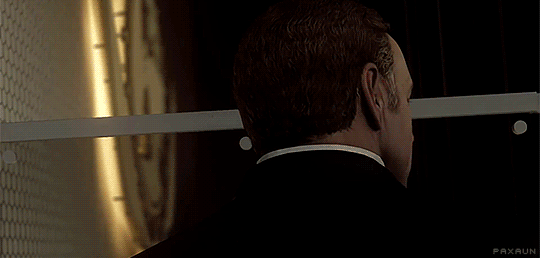
Original gif
Advanced Warfare may not be a series as popular as BO or MW, but I actually enjoyed the game and I also liked Irons. Honestly, I don’t think we’ve gotten that many antagonists that started out as our allies in CoD (at least I don’t remember any others atm), much any less an American antagonist, so that kinda made him stand out to me.
I’m not familiar with Kevin Spacey’s works, and I barely watched any trailers pre-release. So to see Irons go from someone who I believed genuinely wanted to make the world a better place, where every human being could live in peace and thrive, away from the pointless wars that governments waged, to someone who was willing to use any means necessary to achieve his goals, regardless of how many lives he had to sacrifice... well, that was something that hit me hard.
This man who gave my character a second chance, who treated me (Mitchell) as his son, who cleaned up after the colossal mess that others countries made, helped people from devastated war-zones rebuild their lives and gave them hope for the future, turned out to be someone I was forced to betray because of different viewpoints and philosophies. Despite everything, I think Irons had his heart in the right place, but his methods were ultimately terrible and in his messianic delusions he ended up doing more harm than good, so of course he had to be stopped.
And what I liked about him was that he didn’t start out as a bad man, he didn’t do all those things because of greed, and his characterization wasn’t that of a cartoonish villain. In a way I could find logic in his arguments, he made a few good points about the current state of the world and the inability (or indifference) of many politicians to solve the real problems of the people. But the root of it all lies in the loss of his son, his only child, to a government he no longer trusted nor had any faith in doing what was right. Despite having served in the military in his youth, Irons had grown disillusioned at the way the US handled domestic and international policy, and strongly disagreed with them— opposing the status quo in favor of change.
One could argue that serving in the military was entirely Will’s choice all along, and as a grown adult he knew what he was getting himself into. Still Irons couldn’t help but think that if that war had never happened, Will would still be alive. So that left him with a bitter taste, and it served as the catalyst behind his actions.
If nobody else would bother to do anything to actually solve the world’s problems, then he would be the savior to do it— whether they liked it or not. And he didn’t care what methods he had to use, how many had to die, or if he had to plunge the world into total chaos before he could ultimately end all wars and bring everlasting “peace” (perhaps one of the greatest ironies) as his dream seemed to be. Even at the cost of such a high price.
I don’t think Irons gets the credit he deserves.
2. Raúl Menéndez
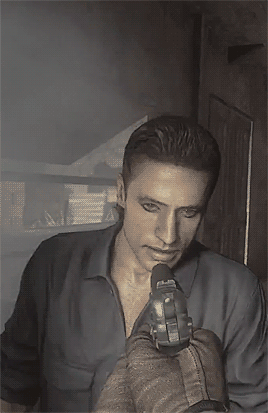
Original gifset
BO2 is one of my favorite games and Raúl is undoubtedly one of the most memorable antagonists in the series. Much like Irons, his actions were heavily motivated by the loss of a loved one but his life is also one sad story, so it’s no wonder he turned out the way he did. Not to justify him, but it’s not hard to understand what led him to do all those things.
From a very young age, his life was destroyed by the actions of Americans, from the horrors of the dictatorship in Nicaragua (in which the Contras were supported by the US); the crippling and disfigurement of his young sister Josefina, due to the greed of an American owner who burned down a warehouse in order to obtain 11,000$ through insurance fraud. After losing everything during an earthquake, and becoming homeless, Raúl and his father started over by selling drugs, successfully establishing a cartel that was so powerful in Nicaragua that they were equally feared and admired among the people.
But this status and power they had newly acquired concerned the US government, and it wasn't long before they sanctioned an assassination order on Raúl's father and sent the CIA in to kill him. Raúl observed it all, a teenager back then, and managed to escape thanks to his father's training. Though he could do nothing to stop it, nothing to save his father, this event marked him and further embittered him against the US and the West. And the last straw was the unfortunate death of Josefina, at the hands of Woods. He lost his sister, the only living relative he had, and his world fell apart. But if we think about it, Raúl was indirectly responsible for her death too, after the horrible torture he put Woods through in Angola. So the next time Woods saw Raúl he lost his mind and threw the grenade that tragically bounced into Josefina's bedroom and killed her.
So he spent all his life orchestrating a huge plan, a brilliant plan, that would shake the US from the very ground. And he was damn charismatic while executing it, earning the support and approval of billions of people all around the world— even from those who lived in US soil!— to begin a world revolution and end the dominance of capitalist nations that had subjugated other weaker countries, amassing huge riches through market economy and wars for resources, destroying lives and sinking many in poverty. And he also manipulates and pits two superpowers against each other... sending everyone to the brink of another world war, or a second cold war at best.
He wanted revenge on the US for playing with the lives of other people, for taking everything he loved away from him, by making them live in fear and destroying everything they had built. He wanted them to feel the same pain, to suffer the way he did. And he wouldn't rest until he achieved that because he had nothing to lose anymore.
Depending on the outcome, he can get revenge on Woods for Josefina, as well. And though we all like it when the "good" guys prevail and foil the plans of the villain, I think this particular ending had a much deeper and stronger emotional impact. The conversation they have at the end is something I didn't expect. Raúl has come to kill Woods but they're both in a place where the years have beaten them down with the weight of they’ve done and rather than an over the top scene, what we’re given is quite the opposite of that.
There’s no screaming, no heated argument between them, no dramatic lines. It’s just two old men who had to live with what they’ve done, and who have come to terms with the inevitability of that moment. Raúl slits Woods’s artery with Josefina’s pendant, and then he does something that surprised me: he closes Frank’s eyes, takes him off the wheelchair and lies his body on the bed. Something that is a huge contrast with what he did to Hudson many years ago... the savagery he used when killing him. For Raúl to behave that way with Woods, the man he considered to be his sister’s killer, it raises the question as to whether he still hated Woods after all these years, or maybe deep down he finally acknowledges that his actions (namely torturing Woods and killing his whole team) was the true motive that led to Josefina’s death.
The thing is, Raúl knows that he's to blame for what happened. It's also the reason why he burns himself alive in front of Josefina's grave. It’s because he has to pay for what he's done to her, too, and he chose to do it in probably the most horrible way possible but it didn’t matter to him. Nothing was more painful than living with the knowledge that his sister died because of what he did.
To him Josefina was the true innocent soul, who didn't deserve any of the suffering she went through.
1. Vladimir Makarov
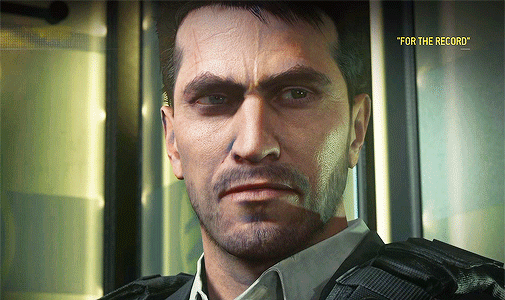
Original gifset
It’s no secret that Vladimir is my most favorite antagonist (and character) in all of Call of Duty.
Though his background and motives weren’t as well developed and explained as those of other antagonists in the series, his untold story (which you won’t find anywhere in the game, though you can deduce if you have a basic idea of the situation before and after the fall of the Soviet Union) perhaps says a lot more about him than one might expect.
There’s not a lot we know about his past other than the meager information that was provided in some loading cutscenes, but it’s reasonable to think that Vladimir wasn’t always the trashbag that we see in the games. He once was a young man with dreams of patriotism, who wanted the best for his country, who loved Russia with his soul, and who would do anything to protect her, because as a soldier that was what he was taught to do. As a soldier, that was his purpose in life and without that reason to drive him on, he had nothing left.
And however vague his backstory may seem to be, it gives you an idea that Vladimir in a way was a victim of a system that imparted a type of soft indoctrination on him, from a very young age (as many states do all around the world in some form or another, even those who hold democratic values), all the way to his education in the military academy and his brutal training in the special forces, that further cemented this undying love for Russia, maybe in a way that bordered brainwashing.
His true radicalization came after the fall of the Soviet Union with the loss of his homeland and the Soviet culture as he knew it, as well as Russia becoming weak and losing much of her power and influence across the world. Then came his deployment in Chechnya in 1994, where he lived the horrors of a war that most likely left him psychologically scarred after the experiences he had to go through. And when he returned home, he was kicked out of the armed forces under accusations of human rights violations during the First Chechen War. And they may be true, he probably did a lot of bad things there (under the illusion that he was serving his country for a higher cause), and sadly it’s something commonplace in many armed conflicts. I’m going to leave this short post here for some details on that.
When he returned from war, he didn’t receive any professional help or if he did, it didn’t work. He didn’t know how to cope, he ultimately was unable to adapt to a normal life, he became a misfit. He had lost his job, he had a stain in his career, and finding a decent way to get by was very difficult at the time when the country was in the middle of a political, social, and economic crisis.
He was in financial ruin, and it was hunger that pushed him to become a criminal (something that wasn’t uncommon for ex military men in 90s Russia). Not just that but also hatred for those in power as well as society as a whole, and what they represented: total decadence and the reason why Russia was falling apart with these “stupid” western conceptions about freedom that in his eyes did nothing but give leeway for debauchery and corruption, which he ultimately sought to “fix” by returning Russia to what it used to be (a god-fearing empire under the autocratic rule of a tsar that was likened to a father to all his subjects, and where religion was used as a resource to legitimize his power and as a moral regulator that maintained the social order).
He pretty much felt abandoned, betrayed by his government— a leadership that had done nothing but sink Russia deeper and deeper into ruin, destroying the values under which he was raised and turning people like him into cynical masses that had lost faith in everything and were adrift without any real purpose in life, no future to look forward to, completely disillusioned that the dreams they’d bought into, the promises they had been sold by the west, were nothing but lies.
He’s still a piece of garbage, we know that, but I also think that he’s gone through a lot of struggles and bad experiences in his youth that marked him and filled him with resentment. Everyone sees Vladimir as the puppet master of the storyline of MW, and we have to give him credit for that, but deep down he’s just a man who has been a slave to his own obsessions and ambitions, unable to free himself from the hatred that has poisoned his mind for years, which led him to commit so many atrocities and strip himself from any semblance of humanity— all for the sake of a higher cause, as he undoubtedly tried to justify his actions at the end of the day.
In conclusion, all three were marked by losses in one way or another, and saw themselves as men who had to take the hard path and do what had to be done. And it’s also curious that Call of Duty, while not a game with any deep meaning on the surface, almost seems like social commentary on how war ruins lives and how anyone can do horrible things if put through the wringer enough times. It’s like these stories are trying to say that bad circumstances can make bad men out of seemingly good people, who wouldn’t have done any of the evil they did if maybe things had been different.
And I think that’s what makes these characters so interesting.
#vladimir makarov#raul menendez#jonathan irons#call of duty#modern warfare#black ops#advanced warfare#i'm really sorry again#it took me a while to write this one!#but it's done at long last c:
44 notes
·
View notes
Text
The Sweet Elite characters as tarot cards
Ooooookay! This is something I wanted to do for a while now (totally not because I'm a huge persona nerd) but yeah, my understanding of tarot cards is really basic and limited so don't take this too seriously! I just thought that it would be fun to make.
--------------------------------------------------
Scholar: The Fool/ The Jester/ The Madman (number 0 or XXII but most times without a number)
Obviously, as the main character, Scholar is the one going on a journey. The Fool is often portrayed as wearing ragged clothes and carrying a small bag with their belongings, showing that they're going on an adventure. The card represents freedom, madness, inexperience and chaos.
Here the description is pretty self-explanatory. I think it's easy to see how Scholar fits this card 👌
Alistair: The Sun (number XIX)
Well, another obvious one! The Sun Arcana is often portrayed as a child or children playing in a field of sunflowers under a blazing sun meaning that their innocence will be replaced with knowledge. The card represents optimism in difficult situations, hope, happiness, discovery and accomplishment.
Now we can make the joke that Alistair is literally a ray of sunshine! 😂☀️ (Not that anyone ever doubted it.)
Axel: The Star (number XVII)
I swear I'm not making these puns on purpose! But since Axel is literally a rock *star* the card does fit him...
The star is often portrayed as a woman with one foot on the ground and the other in water (which is apparently a metaphor for the conscious and unconscious mind) and the star shining above is her core essence. The star in itself can allude to a person with great influence, a star shines above it all but is fated to fall one day. Thus, the Star Arcana represents self-confidence, loss, faith and peace.
Claire: The Empress (number III)
This one may seem weird but when I looked more into it, I realized that The Empress Arcana fits Claire a lot!
The Empress is often associated with the goddess Venus in Roman mythology (and Aphrodite in Greek mythology.) The Empress is seated on a throne in a field meaning that she looks after nature, she also wears a crown meaning that she's the one ruling over nature, not only growing it. The Empress Arcana represents motherhood, romance, life and fruitfulness.
Basically, Claire is like a mom rather than a cold-blooded queen. She just looks after the people around her and that's why the Empress fits her.
Ellie: Fortune/ Wheel of Fortune (number X)
Okay, this one was hard to choose. Believe it or not but at first I gave Ellie the Death Arcana. Though it doesn't mean literal Death but rather starting anew I kinda didn't want to give that card to her since her biological parents are dead... thus I went with the Fortune Arcana instead which is surprisingly similar to the Death one but much more light-hearted!
The Fortune Arcana is portrayed as... Well, a Wheel of Fortune. The card represents opportunity, fate, luck and success.
The reason why I chose this card for Ellie is because even though her parents' death was unfortunate, that bad luck brought her good luck too. If her biological parents hadn't died her dads wouldn't have adopted her and from what we've seen so far, she always says that she's really happy with them and that they're great parents. The Fortune Arcana is all about big changes through luck, be it bad or good luck.
In the end, I'm happy that I changed her card to Fortune because while the Death card also means a new start, that new start is achieved through the end of something else. But in the case of the Fortune card, that new start is achieved through a particular event involving good or bad luck. In Ellie's case, I believe it was both.
Karolina: The High Priestess/ The Popess (number II)
This is another odd one, isn't? Karolina sure doesn't look nor sound like a Priestess 😂 But like with Claire I looked more into it and that card does in fact suit her I think.
The Priestess Arcana is most times associated with Pope Joan, a woman who pretended to be a man in order to become the Pope. It is unknown if she really existed but it is said that the church was so ashamed of their "mistake" that they tried to get rid of all records that had Pope Joan in it. Unfortunately, it is said that she was stoned to death because of her "betrayal".
The High Priestess card represents power, passion, wisdom and tenacity.
Karolina is really headstrong and she's the type of person who would be able to do anything to get what she wants. Thus, I believe that the Priestess fits her.
Neha: The Lovers/ The Twins (number VI)
This one took me a while to find but after thinking for a bit I think this card fits Neha after all.
The Lovers card is often portrayed as a naked woman and a naked man standing before eachother. While the card is in most cases seen as a sign of an irreversible relationship, it is said that sometimes the card doesn't even have anything to do with a romantic relationship but rather having to make an important choice which will lead you to two different paths in life. That's why the man and woman in the card are often separated by a crossroad. The two paths can represent the "right" way and the "easy" way, that's why the decision is so hard to make between those two roads.
The Lovers Arcana represents trials to overcome, beauty, failure and love.
I chose this card for Neha because I think that she's the kind of person who has a hard time choosing between her feelings and her logic. Between the right path and the easy path. I may or may not be completely wrong about this one. There's maybe another tarot card that would fit her better but I thought this one really suits her.
Raquel: Justice (number VIII or XI)
This one is easy to see! Raquel was really vocal about her anger and really protective when the whole Nakano scandal happened.
The Justice Arcana is portrayed as a King or a Queen holding a sword and a balance meaning that they will punish whoever breaks the law. The card symbolizes a strict trial of justice. It represents objectivity, rationality, equity and triumph.
Finally a simple one to explain! At first I was considering on giving her the Strength Arcana but I like Justice better for her. It might be a stupid reason but I think that the Justice Arcana sounds cooler than the Strength Arcana 😅
Tadashi: The Emperor (number IV)
I legit wanted to try and give him the Death card somehow to keep up with the trend of "haha, you like bullying Tadashi!!" (Which is not wrong but sshhh!🤫) The Death Arcana just didn't fit him in any way I think. I mean, you could say that when his father was arrested and he broke ties with him it could be seen as a new beginning for him and a big change in his life. However... to apologize for all the time I treated him like shit I decided to give him the Emperor Arcana (which sounds really cool, right?) Also, this card really fits him so I'm happy with how it turned out!
The Emperor is portrayed as... Well, an Emperor (duh) sitting on a throne, he's often associated with Mars, the god of war in Roman mythology. However rather than mindlessly going to war, he's considered to be a guardian who fights for the peace of its people. That's why The Emperor Arcana represents fatherhood, compassion, stability and protection.
But of course, to diss him just a little bit, The Emperor Arcana can also mean that maybe you're trying too hard to look after everything, you have a strong desire to control everything in your life (which is obviously impossible to do) and that mindset may or may not end up with you giving trouble to the people around you.
Yep, it sure sounds like our mister student council president 😂
Tegan: The Hermit (number IX)
Oof, okay. I'm not totally sure how to explain this one but you'll see that this card suits him.
The Hermit card is portrayed as an old man in a dark place or on a cliff carrying a lantern to illuminate his surroundings. The card represents introspection, inner guidance, prudence and wisdom.
Basically, the way I see it is that Tegan is someone who helps others from behind the scenes. He never puts himself on the spotlight however he's a really smart and driven individual. Kind of like a candle in the dark if we want to go into cheesy descriptions 😂 But yeah, he has a great value and he often does his good deeds in the background so he's seen as a support even if his place in the team is really crucial he rarely takes credit for it. (Probably because he does his best to turn the attention away from him 😅)
Tyler: The Moon (number XVIII)
And finally we have Tyler! Oh godddd I love him 😭💗 Anyway, here goes.
The Moon Arcana is portrayed as a wolf and a dog howling at the moon, they symbolize our fears in the conscious and unconscious mind. The card represents inspiration, illusions, fear and creativity.
From that conversation we had with Tyler in chapter 8 I think it's pretty obvious that he has some self-confidence issues. He's scared that he isn't good enough. He's constantly comparing himself to others and doesn't see how amazing he is 😥 But of course there's also the creativity and inspiration part which hints to his talents in the fine arts 👌
--------------------------------------------------
Aaaaand that's a wrap! This actually took me longer than I expected but I'm happy I did it! It makes me feel like I was productive today even though I didn't finish my homework... yet.
34 notes
·
View notes
Text
RWBY Recaps: “Worst Case Scenario”
Happy Saturday, everyone! I’m so torn on this episode. On the one hand it managed to do a lot of the things I’ve been looking for this volume. On the other hand they’re a bit... shaky. And at least a month too late. But we’ll dive into all that in a bit.

We open on Penny in an Atlas facility which was actually a relief for me. Though I wouldn’t expect it for Penny’s characterization, last week’s order to head immediately back to the Academy alongside her blasting off without saying a word to anyone could have implied that Penny ran off. We could have started the episode with her missing, needing that space, but compounding how guilty she looks in the process. So emotionally I’m glad Penny didn’t unintentionally make her situation worse, yet in all honesty her situation isn’t nearly as bad as “A Night Off” implied it would be. We learn within a few minutes that Atlas techs had no difficulty discovering that the video was doctored, even if the general population isn’t convinced of that yet. Ironwood believes her. So do the Ace Ops and all of RWBYJNR. Robyn wasn’t out to seek revenge on Penny or anything, she just redoubled her efforts to help Mantle as a whole. The only thing that stunt seems to have achieved---besides general stress/division which, frankly, an attack without any framing would have created just as well---is the call to deactivate Penny. But as we just established, no one in power is inclined to do that. No one, from Ironwood to Winter to Pietro, is swayed by this “Penny is a danger” rhetoric. And what’s the public going to do? Storm Atlas and deactivate her themselves? For all the emotion Pietro shows, it doesn’t feel like Penny herself is in any danger, only her reputation. Nor does it feel like the villains’ plan has succeeded in hurting the heroes’ plans. The conflict of today’s episode regarding whether Ironwood continues to pull from Mantle to finish the Amity project existed before Penny’s framing. That just added some tangentially related drama. Feels like a missed opportunity for the villains’ well-executed frame job to, you know, actually achieve something.
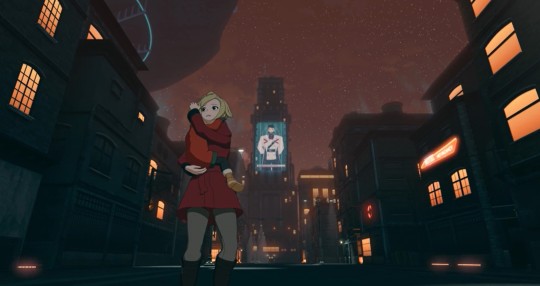
I’m getting ahead of myself though. In an effort to prevent any more killings Ironwood cracks down on security, announcing that there are to be no public gatherings of any kind and that everyone must obey the curfew. It’s another case of “You can’t treat people like this” up against “I’m trying to keep people from dying via serial killer.” Obviously not everyone is obeying these new laws. Alongside a few civilians braving the authorities, Robyn and her Happy Huntresses are out stealing the supply trucks meant for Amity and re-distributing those supplies to the people. As a lovely anon pointed out (I’m so far behind on asks I’ll work on that!) how is sucking an entire truck and all its contents into your hand not magic? It’s just another example in a long list of world building details that RWBY hasn’t bothered to think through because they never established rules for their fantasy universe. Hell, at this point semblances are far more powerful and mind-bending than the actual magic we see Ozpin and the Maidens performing. What’s a bit of fire and lighting up against, “I can pull a ton of metal and supplies directly into my skin”?
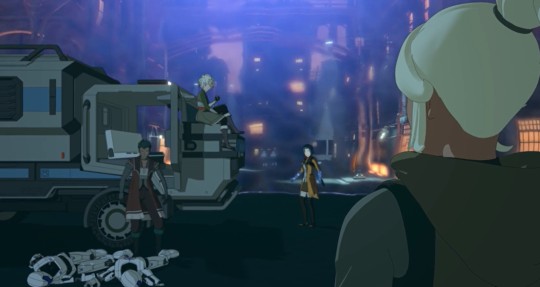
With another truck in their possession we return to the group in Ironwood’s office. He title drops with how this is the worst case scenario: more people are dead, Penny is framed, and Jacques is somehow sitting on the council. Of course, any long-time RWBY viewer knows that this probably isn’t the worst case scenario. Things will no doubt get so much worse. Clover summarizes by saying that Robyn has moved from “hometown hero to full on vigilante” and then we enter the portion of the episode that made me want to beat my head against a wall.
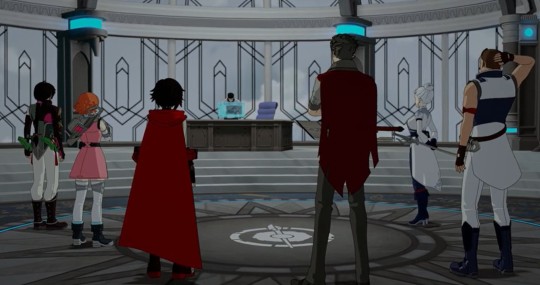
Here’s the lowdown. The Amity project is permanently stalled because Robyn is taking all the supplies needed to finish it. They’re having trouble stopping her because those Happy Huntresses have one hell of a collection of semblances. A possible solution to this problem would be to declare martial law, further increasing the presence of the military in Mantle and thus, hopefully, stopping her. This would, however, further divide the people of Mantle from Ironwood. So what to do? Decisions, decisions.
The reason why this conflict isn’t a compelling investment for the viewer is because it still hinges on knowledge that Ironwood doesn’t have. As Yang herself will later say, “Do you think we should have told Ironwood about Salem? Before he put so much on the line for Amity?” Every choice he makes is done under the impression that he can defeat Salem and therefore these sacrifices are worth it. Amity Arena is top priority because once we unite the world against her she won’t stand a chance. Losing some defenses in Mantle? Incurring the peoples’ hatred? Declaring martial law? Even risking lives via grimm? All of it is worth it because in the end he’ll have rid the world of a woman who has, single-handedly, changed entire kingdoms for the worse. Remember that Mantle only looks like it does now because Ironwood witnessed firsthand how Salem wormed her way into Beacon and burned it to the ground. From destroying entire schools to killing people at parties, she is the world’s biggest threat. It makes perfect sense to me that he would be willing to go to these lengths in order to stop her. We can debate, as Oscar does, when he’ll have gone too far or if he already has, but that logic remains sound. You’re worried about peoples’ immediate needs? I’m worried about the day when Salem breaks into this kingdom and straight up slaughters them all. It’s inevitable. So Ironwood says yes, we need to make things worse now so that they can be better later. We need to make sacrifices.
Too bad he doesn’t know that it’s all for naught.

Which brings me to the group’s reactions. I mean... holy shit. First off, when Ironwood announces that Amity is on hold Ruby gets super upset. “But we’re so close! There must be some way we can finish the tower.” Ruby, why are you pushing for this to be a priority? You know that Salem can’t be killed! You know that telling the world about her will achieve nothing but panic! People aren’t going to unite against an immortal grimm queen. They’re going to do precisely what you all did before the story decided to gloss over or outright ignore your motivations for fighting an “impossible” fight: They’ll give up. They’ll fall into despair. They’ll make like Qrow and decide that nothing has meaning anymore. Why would it when there’s an immortal antagonist hell bent on our destruction? Ruby’s ‘But we have to finish the tower :o’ reaction makes no sense. Going along with this project because she’s comfy cozy being an Atlas huntress makes sense. Hypocritical, but still. Ruby pushing for the project when it’s doing even more harm, when she knows its primary use is pointless? Prioritizing it over those immediate needs? Like... what? This should have been the moment where Ruby came clean. Or at least kept quiet and looked guilty some more. “Yeah, Ironwood... now that this project is unambiguously hurting the people... you should probably know that it’s kinda... not gonna work...”

Then there’s Nora. Remember how I said I wanted her status as a poor orphan to clash with the privilege and authority around her? Yeah, would have been great if there was at least a little build-up to that. Or if another character acknowledged why she, out of the whole cast, is literally screaming at Ironwood over his choices. I mean sure, like with Oscar not showing up to fight the geist there’s an obvious answer here---Nora was once one of the people in Mantle. Not literally, but in all the ways that matter. Or, if you believe some theories, yes literally if she was originally born here---but it would be nice if the show actually established some of these connections rather than banking on the viewer not only picking up on them, but assuming that the writing indeed meant to create that link. These moments of personal growth are too important to drop in with so little lead in. We see Nora comment on the state of Mantle when they arrive and from there it’s just her steadily challenging Ironwood more and more. No acknowledgment as to why that’s such a sensitive topic for an otherwise bubbly girl and no deconstruction of these feelings after she shows them. I’ve mentioned before that Ironwood is crazy calm while having a bunch of teens challenge him like this. Same here. The level of fury Nora demonstrates is staggering given how, from a ‘What have we seen on screen?’ standpoint, it came out of nowhere.
The best part though is when Clover points out that telling the city there’s a serial killer on the lose could make things even worse. Suddenly the situation wouldn’t be, “Ironwood’s robot inexplicably attacked once but is now safely in custody” but rather, “The killer is still out there, wants to kill more, and is fully capable of doing so.” Cue more panic. Cue more grimm. Considering that this is primarily Nora’s concern, the fact that Mantle is vulnerable to grimm attacks through a combination of resources going to Amity and their general despondence drawing the monsters in, this point should be very relevant to her right now. Oh yeah, maybe we don’t want to freak people out even more because then more people die. The people I am currently trying to defend.

Instead she throws up her hands and exclaims, “I am so sick of secrets! If we just told everyone about Amity, about Salem---!” Then she’s cut off by Ironwood.
Nora. I love you. I really, really do. But:

This is my holiday card this year lol. A stranger and a random dog I found on PicsArt spouting my feelings. Happy Holidays. Needless to say, we’re more than halfway through the volume and I’m so over this high horse the group is riding. Nora’s stance would be a compelling one if she weren’t demanding from Ironwood the very thing she and her friends are unwilling to do.
Although, that little slip says a lot about precisely how far the group is taking the ‘no one is allowed to keep secrets but us’ stance. Tell Mantle about Salem? Really? They know that won’t accomplish anything in the vein of uniting them against her like Ironwood intends. Not if killing her is their final goal. Nora seems to want to tell them because secret keeping is just a Bad Thing and Ironwood is a Bad Man for keeping information from his people. Forget the consequences of telling them and, again, forget Nora’s own hypocrisy. It’s really amazing how far the writing is taking this assumption that anyone who keeps secrets from anyone else is automatically in the wrong unless you’re RWBYJNR.
Bleh. We’ve gotta move on. Too much else to cover and what more is there to say? The writing is an absolute mess.
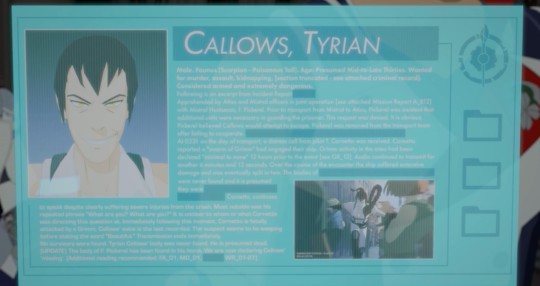
Prior to Nora’s outburst we learn more about Tyrian. Tyrian Callows, as his file reveals. For those of you who weren’t inclined to read that teeny tiny print, my tired eyes are here to help. Winter gives a basic summary of Tyrian’s record and subsequent arrest/escape, but the scroll provides more details. After a series of murders he was detained and set to move from Mistral to Atlas. The man in charge, Pickerel, wanted additional forces for this move, clearly expecting that Tyrian would try to escape. He was denied this and eventually kicked off the mission for not cooperating. During Tyrian’s transport the airship was attacked by a swarm of grimm, despite the fact that the area they were passing through was considered relatively safe. Tyrian continues to speak throughout the ship’s transmission despite severe injuries from the crash. He was heard saying, “What are you? What are you?” sobbing and eventually ending with “Beautiful.” (Edit: My mistake. Cornetto is the one who asks, “What are you?”). At the time Atlas officials assumed he had been killed by grimm, despite the fact that no bodies were found. There’s a note revising this to say he was suspected to have escaped after Pickerel was found dead in his house.
Obviously, Tyrian met Salem that day.
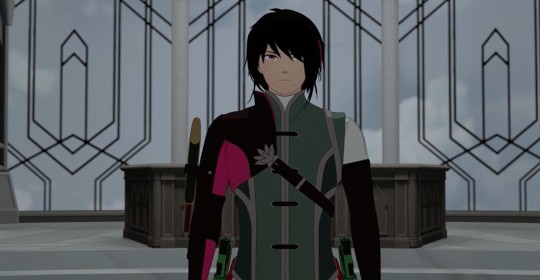
So Winter and the Ace Ops aren’t pleased to hear that this notorious serial killer is in their city and working for their greatest enemy, but at least they all believe Ruby about what she saw. Ironwood eventually shuts the whole conversation down, announcing that they need to put their efforts towards stopping Robyn and Tyrian. Winter and Clover give the expected, “Yes, sir!” in regards to this order. So does Ren. Like I said last week, ignoring all his concerns and trying to fix things with a kiss is not something that works. Glad to see Ren’s new work ethic and devotion to the fight didn’t magically disappear because Nora decided to make a move.
We transfer to Yang and Blake where they FINALLY bring up Adam. Hallelujah! It’s too little too late, but as I’ve said before, better late than never. Granted, it’s not much of a conversation. Yang insists they did what they had to do. Blake says she never wants to be in another position where she’s forced to kill someone. Understandable perspective, but not really the sort of thing you can control when plenty of others are out to kill you. Unless Blake swears to never kill again and upholds that ideal over the inevitable danger to herself and others, that’s just not something she’s going to be able to avoid.

Still very glad it exists, but considering that their talk didn’t actually delve into much regarding that trauma I’m more interested in the things they have to say about the continued secret keeping. This is where Yang once again questions whether they should tell Ironwood and finds that Blake doesn’t agree. Why is this significant? Because I don’t think I’ve ever seen someone disagree with Yang and get out of it without a glare at best, violence at worst. Yang herself points out that Blake doesn’t seem to be on board with her perspective and is so very gentle about it. It’s clear Yang in no way blames Blake for this difference between them. She legitimately wants to understand her position. Once again, I’m torn. On the one hand Yang should absolutely be commended for the mature way she handled this conversation. On the other hand... it’s Blake. We’ve already seen time and time again that Blake is the exception to Yang’s every rule. I wasn’t joking when I said back in Volume 6 that I primarily like Yang as a character when she’s interacting with Blake because it’s only when she’s with Blake (and to a lesser extent Ruby) that we see this calm, rational, sympathetic version of Yang. Though it is, as said, great that she can approach a difference between them in a healthy and level-headed manner, I’d also like to see her manage the same with someone other than the woman she’s clearly in love with. I’ll believe that Yang has undergone actual growth when she can demonstrate this kind of maturity with someone she’s not already eager to impress and desperate not to create a rift with.
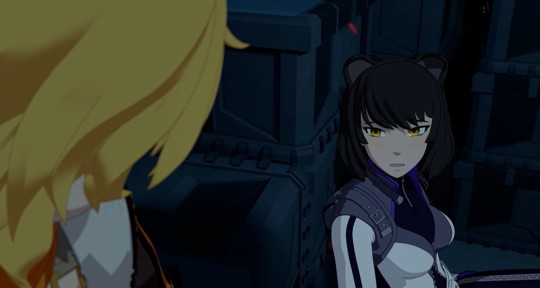
In addition, we get to watch Yang explain how Ironwood “didn’t have many good options” and Blake responds with, “I’m not sure there are many good options left for any of us anymore.” Yet somehow, astoundingly, neither of them manages to apply this perspective to Ozpin. The cast is literally repeating all the arguments I’ve made in Ozpin’s defense---trusting people is dangerous, secrets are hard to part with, you’re not a bad person if you only have shit options to choose from and have to choose something---yet no one actually acknowledges the one character this most applies to.
It’s after all this talk of secret keeping that Blake and Yang decide that they don’t have to follow Ironwood’s orders. Which... is a problem. Because yes actually, they do. Remember how they’re official huntsmen now? Remember how this is a job that comes with rules, regulations, and adhering to the orders you’re given? I’m not saying they’re morally in the wrong here. We can likewise debate the significance of Robyn having this information, whether she’s trustworthy, etc. Rather, I’m merely pointing out that by taking on this job the group agreed to follow Ironwood and obey his instructions. They’ve now broken that promise. It likewise raises the question of whether they’ll tell everyone about this. Based on Blake’s “We’ll distract [the Ace Ops]” it doesn’t sound like they’re going to walk into Ironwood’s office an hour later and admit that they made their own choice based on their own moral code, giving him the chance to dismiss them. I don’t want people working for me who I can’t trust to follow my orders and all that. Which would mean, you know, that they’re keeping another secret. That cycle of hypocrisy will continue, now in the form of Yang and Blake patting themselves on the back for not hiding information from Robyn while likewise hiding new information from Ironwood. So I’m interested to see how and if they’ll admit to this decision, one they made without Ironwood’s or the rest of the team’s input.

Of course, Blake and Yang only get half a pat on the back here. It’s not like they actually came clean in regards to Salem, the primary secret hanging over everyone’s heads. They are, again, acting precisely like Ozpin: doling out little bits and pieces of information as they see fit. I thought for a moment that they truly intended to tell Robyn everything but would be interrupted before they could. Instead Yang says straight out that they’re refusing to come clean about it all and Robyn swears that she “won’t stop until I learn the whole truth.” So congratulations, you further solidified the parallel between you and the man you’re still ignoring, made a pretty huge decision without the input of your partners or boss, and will potentially hide that information in an ever growing list of secrets. If that’s the case that will bring Yang’s total to five: my mom is the Spring Maiden, Salem can’t be killed, the relic attracts grimm, we’re the reason Ozpin is missing, and Robyn now knows about your project thanks to us.
During this whole conversation Robyn reveals that she has the lie detector semblance rather than Ironwood and... Really? I brought up before how many problems that inevitably causes. Case and point: if Robyn can just clasp someone’s hand and tell if they’re lying, why not do that with Ironwood weeks or months ago? Prior to Tyrian’s attack it was abundantly clear that Robyn would prefer to work with Ironwood but isn’t sure she can trust that he has the people’s best interests at heart; Ironwood likewise would prefer to work with Robyn but isn’t sure he can trust her period. Ironwood literally told the group last episode that the fact that they’re not already working together isn’t fully his fault (like the group wants to insist). Working together requires both parties being willing to come together... and here’s a super easy solution on Robyn’s end of things. Not sure about Ironwood’s motives? Shake his hand, ask him to make a statement about it, and find out! For me, the reveal of this semblance just puts more responsibility on Robyn’s shoulders than Ironwood’s. She could have taken more steps towards reconciliation, confident in her unique ability to confirm information. Ironwood? He’s working on pure faith in people which, as the last two volumes have shown, isn’t much to work with at all.

I don’t even want to get into the issues with this semblance moving forward. Unless Robyn because a full-blown enemy or is killed in the finale, every times someone is worried about lying I’m going to ask, “Why not just get Robyn?” It’s too easy a solution, one that writers are inclined to ignore when they don’t want a quick answer, and that disconnect rankles.
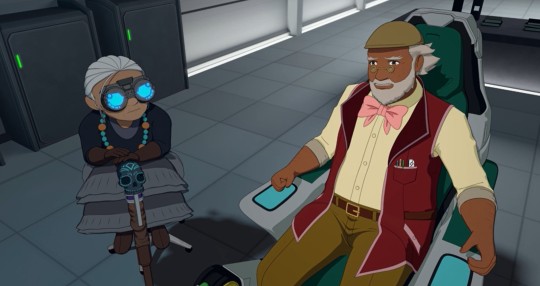
We segue to Pietro’s lab and hark! A Maria! She’s apparently been helping Pietro out with all the Amity Tower stuff lately, much appreciated work considering he would have collapsed under the workload otherwise. How kind. A perfectly logical use of her time. Now why couldn’t you have told us that five episodes ago?
Tiny edits, Rooster Teeth. Simple revisions. RWBY continues to read like a first draft. Plenty of potential, but there’s so much missing or disorganized that the viewer is left frustrated because we can see so clearly what it could have been... but we didn’t get that. A pity.
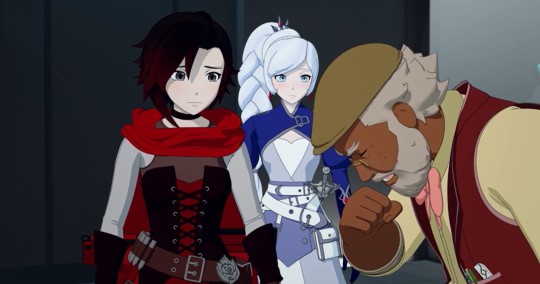
With Maria’s existence re-confirmed we dive into a number of revelations. Most notably that Pietro didn’t succeed in creating an artificial aura for Penny, he merely found a way to share a part of his with her. That’s why he’s so ill and the more times Penny needs to be rebuilt, the more aura he has to give up to revive her. The assumption? There will come a final time, likely at the end of the volume, when Penny will need a recharge and Pietro will die. It’s a setup I’m actually thrilled about if we ignore the obligatory grief over losing a good side character. That reveal was a surprise for most viewers, yet is something that still makes sense based on what we previously knew (a lot of “twists” end up retconning past info) and would lead to a very satisfying ending. Pietro, already an old man, passes on knowing he’s given his daughter the best life he can. All this coughing and death flags reach a conclusion by the end of the volume. Penny is saved but from here on out everyone knows she’s mortal. It adds weight to every fight she’s in and removes the probability that she’ll indefinitely live out everyone she’s ever loved. She might have a longer lifespan than most if she keeps herself safe, but she’s not immortal. All around? One of the best things Rooster Teeth has introduced in ages.
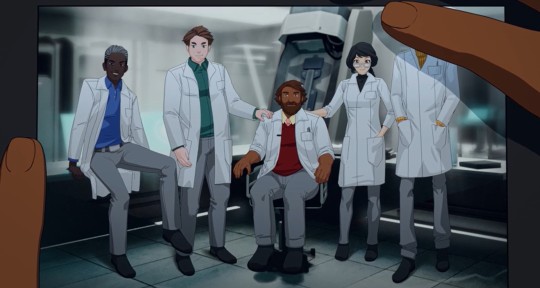
We also see Weiss closing in on Jacques’ involvement in the attack. Only a few people have access to Mantle’s security, one of which is directly connected to the Schnee Dust Company...
Finally, god bless, our favorite farm boy gets a scene. An actual, full-fledged scene in which he speaks multiple times.
I could cry. It might be the only significant scene we get with Oscar this Volume, but it’s far more than we’ve had in an age. Hell to the yes.

Basically, Ironwood shows off the Staff of Creation’s vault and admits that this is what is keeping Atlas afloat, not gravity dust as everyone else assumes. Which is a revelation not nearly as well done as Penny’s. Floating? That’s what this all powerful magical object does? How in the world does that connect to creation? And why bother doing that at all? It’s clear that gravity dust can keep things up---Ironwood said that they’ll have to lift Amity the “old-fashioned way”---so why bother using the relic for that when an “endless power source” could potentially be used to do so much more? Or let’s say dust can’t lift a whole city (even though you’d think someone would have realized that by now if that’s the case, questioned how the hell Atlas stays up there...) why is that so important? Just overall grimm protection? A symbol of status? This reveal seems to raise too many odd questions and, frankly, feels like a clumsy setup for the finale. Meaning, now Atlas is in risk of falling. If someone steals the relic or decides to move things along by lifting Amity with it, the entire city comes tumbling down.
With info out of the way Ironwood admits that he’d hoped coming to this place would spark some memory in Oscar, talking about him as if he is Ozpin, rather than just housing him. He likewise says later that “Eventually you won’t even know who’s who anymore.” Everyone cry over Oscar’s expression.

Jury’s out on whether Ironwood knows this for a fact or whether he’s working under an assumption, like much of the fandom, that Ozpin and Oscar will eventually merge into one new-ish person. After all, from what we saw in Volumes 1-3, Ironwood only ever interacted with Ozpin as one individual, so he has little reason to think there was always another, distinct person hanging out somewhere in his mind. But there could have been. I’ve mentioned in previous metas that if Ozpin and Oscar remain distinct, it makes perfect sense that Ozma would have been the one running things at Beacon, leaving the much younger and inexperienced host to take a backseat during those conversations.
Indeed, I thought for a moment that Oscar would say, “You can talk to him,” finally acknowledging that if someone tries to address Ozpin as his own person he might actually respond. He just says “You can talk to me” though. Which, yes. I also want people to talk to Oscar. It just astounds me that everyone continues to act as if Ozpin is literally out of their reach, rather than potentially a “Hey. I’m sorry. Can we talk?” away. Maybe Ozpin won’t answer, but someone could finally try.
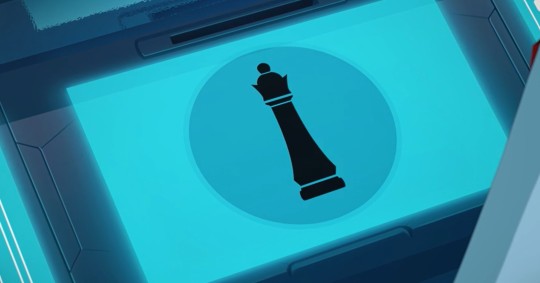
They talk about how horrific it was for Ironwood to watch Beacon fall. We get a wonderfully creepy flashback to Salem’s chess piece, reminding us that she’s not just dangerous, she’s malicious. Salem enjoys watching those around her suffer. “The way she told me she was there.” They likewise discuss whether Salem doesn’t have an advantage without her humanity and Oscar cautions Ironwood that saving the world isn’t worth losing his own. Not to call out my favorite farm boy, but that’s a real easy stance to take when you know Salem is immortal and Ironwood doesn’t. Again, every sacrifice he makes is under the impression that it’s taking him closer and closer to a world without her. To his mind, losing his own humanity might be worth it if it rids the world of her once and for all. Meanwhile, Oscar is working under the impression that defeating Salem won’t ever happen. Why give up your humanity for an impossible dream? They’re coming at this from completely different angles and until everyone has the same info the group’s stance on Ironwood’s choices holds no water. The fandom loves insisting that RWBYJNR couldn’t have made an informed choice about joining the fight until they knew about Salem, despite the fact that they had already agreed to fight an immortal enemy (the grimm), had already risked their lives for the people, and clearly intended to continue doing that in the future. Knowing about Salem had no bearing on the question, “Do you want to help?” because they’d already answered that numerous times. In contrast, this is a situation where Ironwood actually doesn’t have all the information necessary to make an informed decision. You want to judge him for his plans and his willingness to sacrifice it all in the name of defeating Salem? Fine, but you’ve got to stop working with a different set of rules than him first.
Of course, despite being alone in the bottom of a vault, despite introducing Oscar’s (supposed) reservations about keeping secrets earlier in the volume, despite this insight into why Ironwood is making these choices... Oscar doesn’t tell Ironwood either. So much for the, “Oscar will spill the beans to Ironwood” theory. It could still happen, but like so much else in this episode by then it’ll be too late. The moment passed.

Instead of any progress in that regard they just head upstairs where Winter and Penny are waiting with a letter from Jacques. He’s invited them to dinner where Ironwood will defend his position on the council. Looks like Oscar’s advice to “talk to the people you’re most afraid to” came at them like a battering ram.
And that’s it for this week. What have we got left? Six episodes? Far too few to cover everything the story needs to. I’m gearing up for a bumpy ride this holiday season.
Until then, folks!
Minor Things of Note
The robot patting Penny’s head? Wonderful. Stellar. Absolutely fantastic detail. The idea that the Atlas facilities are populated with semi-conscious AIs and that they care enough about Penny to offer her support is just precious.
I like many of the shots we got this episode. Penny looking like she’s behind bars and Ironwood shrouded in a mist-like window are two that stood out.


57 notes
·
View notes
Text
Faith versus Logic Final
Could Shara’s rule be an ideal system?
Click here to read the previous part of this article
If you want to give the example of Sharia law as an example of low crime rate and safe environment, and then also consider that ten countries of the world with the lowest crime rate Iceland, Denmark, Austria, New Zealand, Portugal, Czech Republic, Switzerland, Canada, Japan, and Slovenia are there— so why not their system is ideal?

Sharia laws were defined at a time when there was a tribal culture in Arabia – the monarchy was the system. In that era, there were often wars for animals, women, domination, and expansion of power, in which women were widowed largely— to support them, more than one marriage or to make them mistress was allowed… what wars are happening now?
If the people living there accept it due to happiness or helplessness, but even if enjoying full civil liberties in democracy, the Sharia system of Saudi Arabia is attracting you, where there are restrictions at every step, then you are religiously ill— and you don’t want to think anything beyond faith. Even in that system, this thinking of mine will also come under Blasphemy because I raised the questions, whose punishment is death— do you want such a system? I really do not want it. The one who follows another religion cannot get citizenship there nor can he adopt his method of worship.
How did humans start their journey on earth
And in India, those who are advocates of Sharia seen wandering here and there – there is a request to them that even if our rule is a democracy, but as a true believer, they should apply the Sharia to themselves and don’t do anything which is wrong or a crime with the Shariah. For example—
Avoid the interest-bearing banking system— immediately cash whatever mutual funds, shares, FDs you have. Avoid stealing power, which is the most common custom among Muslims. If photos are not allowed in the house, then break the TV and throw it away. Since porn is also available on mobile and you can see a picture/video of unknown women on Facebook etc., then quit using your Smartphone and keep a simple buttoned mobile. Do not wear tight clothes (jeans, t-shirt, etc.). On the way, getting-up or sitting, do not look at any girl and woman. The Sharia has made the daughter a shareholder in the property, immediately give her due right to your sisters or daughters. These are the deeds which Momins are doing indiscriminately— the rest things like gambling, liquor, womanizing, are a different issue.
If you can do this much then try doing it, then after that, if you talk about Sharia law or Sharia, only then your say will matter to the people.
Did God make a man or the man, made God?
God created man or the man, made the God— this dispute may never be resolved, but an unseen God is in existence ever since the first human being in the world would have found first hope amid awe. Fear and hope – right here begins the God, and even though he may not have been known in any particular way then, but as man became smarter, God too became accepted in different forms and its separation is the prevalent “religion” at present.
Where did religion come from and how logical from the point of view of science?
The real meaning of religion is not what is in front of everyone in the world today, but its practical meaning is this— you are Hindus, I am Muslim, that is a Sikh, that is a Christian and that is Jew.
So for a while, free yourself from this tilak, cap, cross, turban— and find out what is religion? What is its real form— why is it and what has it given to you? What are you achieving from this religion?
Leave the past in the past, whatever was written in those books, was according to the circumstances of that time, was written to handle the humans of that time. Come in the present and think, can it be a religion to abuse someone, or to speak to someone with love should be the religion?
Can it be religious to hate someone or to love someone should be the religion? Taking someone’s life should be a religion or to save someone’s life? To take away someone’s right can be religion or to help any poor fellow to get his right? Can injustice done to someone be religion or give/help to get justice? To torture, someone with the opposite ideology can be religion or to give respect to people of other ideology?

Think as many questions like these as you can think, think those questions with closed eyes and introspect yourself honestly. Test your answers on the criterion of religion you have been carrying from generation to generation. Think, brainstorm what religion was for— why there was a need for religion and how you are practising that religion. Among Hindus too, “Meditation” is said to be the way to seek God and to connect oneself with him and in us too it is called “Salat”.
what possibilities are there in the universe outside our planet
Salat means meditation, that is, attaching oneself to God— the Prophet adopted this Salat as “Namaz”, Sufis in some other form— but later on people adopted Namaz as a rule and today its meaning is lost somewhere. Do not ask me this question, but ask yourself whether you reach that state of “meditation” in Namaz? That you feel connected to Allah or does your mind keep wandering in worldly additions/subtractions? Remains stuck in High pyjama or Skull cap? Do you find yourself ever close to “Salat”? If not, find out the reason for that.
However, if by churning so much you do not get this pearl of knowledge, that to hurt someone is not a religion, but to help in someone’s suffering, to help him overcome his suffering is religion— then be sure, that there is a lacking in you being a human.
Religion, Iniquity and Foul-Iniquity
Here people are often seen asking the question, what is religion? So the question is right in its place but the answers of those in front can be different… Actually, when you say Religion in English or ‘Mazhab’ in Urdu, it has a direct and only meaning— The particular ideology, creed, the enclosure bound with the law of uniformity— but when you say ‘Dharm’ in Hindi, then it has two meanings. The first meaning that is commonly practised is Religion itself.
If God is there then how can it be from the point of view of science
But what it has as another meaning is, in fact, the actual meaning of the word “Religion”. Your good deeds— your behaviour that is in harmony with the welfare of humans, that actually is the religion. Now understand this in detail—
Every small or big practice of your entire life is divided into only three parts— Religion, Iniquity and Foul Iniquity. Maybe you ever gave attention to this or not— but every little or big work of yours, every small or big decision taken at every step of your life, comes only under these three rules.
Telling the truth, supporting the truth, living honestly, avoiding false deception, doing justice, to support the justice, to stand for the rights of the victim, to stand against the cruelty, not doing injustice, helping others, avoiding illegal, excluded and selfish deeds that are outcaste by society, means to say that everything you do for the betterment and welfare of human beings… is actually religion.
And on the contrary, whatever you do, the result of which is harmful, troublesome to any human being, which gives suffering… will come under the purview of Iniquity.
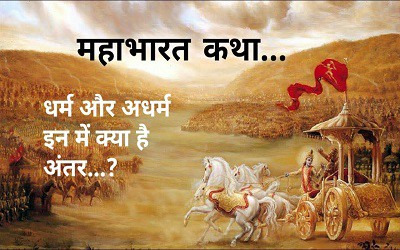
Now there is a link between them, that is, your acts which may seem iniquitous to appear but religion is hidden in them— that is a ‘Foul-Iniquity’ You can understand this with two or three examples— You lie in a place where telling the truth can be harmful to one or more humans— then that lie of yours is Foul-Iniquity. You steal somewhere, where the stolen goods have the welfare of others hidden behind them and not your selfishness, then that theft is a Foul-Iniquity.
You stand somewhere with a Cruel, and there you can help the victims in any way, then it is a Foul-Iniquity to stand with that cruel. You may or may not understand this, but every activity of yours is tied to these rules. And the interesting thing you will find is that it is the core of all religions. On this basis in the Gita, the ‘Kauravas’ were declared unjust by Lord Krishna, or else they also believed in the worship of God and other things— and in fact, “Kafir” in Islamic Mythology has also been determined on this basis. People derive the meaning of ‘Kafir’ as an atheist or non-Muslim according to their own belief.
what are the possibilities for new writers
Whereas, as a religious person, whatever rituals of worship, Aarti, Pilgrimage, Roza Namaz, Hajj, Zakat, etc. have you mistaken as religion, they, can be called the flattering methods or ritualism of God, but it is not the real religion. Real religion is your good conduct, with which if you do these rituals, then in a way we can see them as religion, but alas that it does not happen in practice.
The real religion is Humanity and not these worship methods
Let’s give many examples of this and explain— A true Momin believes in himself that by doing Namaz, keeping Roza, and doing Haj, he is doing a lot of good work and he will get a lot of praise for it – but while he sits at the shop and lying to the customer that this much of this merchandise is purchased, he can give it in that much— though this is not true. He is performing all the good rituals but he is sitting on the rented or untitled land occupied by a house or shop. The stolen light is glowing in the house and after washing himself with water pulled with that stolen electricity, he is reciting Namaz. He is eating sacred food made on the heater burning with that stolen electricity.
Consuming water, fans, lights obtained by direct theft or rigging of the electricity in the mosque, is washing himself and performing Namaz— Performs Haj and becomes a Haji with the money acquired through bribes, commissions, frauds, rigging or by other illegal means. Performing Namaz by surrounding roads as religious work, doing processions, even if all traffic is disrupted, may someone miss their train, plane or bus… or may someone die in an ambulance.
How to write a book in Microsoft word
Similarly, a true Hindu by applying a Tilak on the forehead, ties a red thread in his hand, chanting Ram-Ram day and night, keeps on ringing bells for hours in temples— but at the same time lies, deceits, manipulations, deception are all being done. Donating from the money saved through commissions, bribe, black marketing, stealing tax. The religious pandals are decorated with stolen electricity. Narrating religious stories by installing big loudspeakers, DJ sound— whether there are sick people around, children going through exams or people are going crazy by the noise.
They have been occupying the streets in the name of Ganapati, Navratri, Kanvar processions, even though the traffic system is collapsing. By surrounding the roads in the name of Jagran or big sacred type of religious events and causing problems for the people wandering around— by making noise pollution from the heavy sound systems, making people around it sick— but thinking that he is doing very religious work and this will give him great virtue, which will lead him to salvation or heaven.
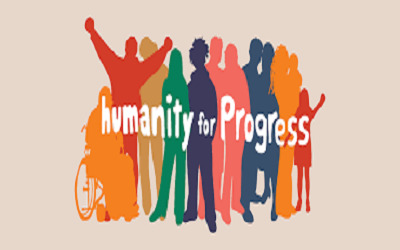
In the name of religion, all these people who commit hypocrisy, pretence are in deception— they are confused as to whether they are doing any religious work worth virtue. Actually, while knowing all of this, he is engaged in wrongdoing with closed eyes and it is not that he has is no feeling of it… he has it and to erase the guilt created by this feeling, they try to show that they are very religious people and continue to prove others as trivial, by making a lot of noise from personal life to social media.
What do you think are these religious people and if there is a God/Allah will he be happy with them? So by putting yourself in his place and thinking about it, maybe instead of being happy on their gimmicks, you will reel off their skin by hunter until they do not truly understand the difference between religion and Iniquity.
इस लेख को हिंदी में पढ़ने के लिये यहाँ क्लिक करें
34 notes
·
View notes
Text
fanfiction: and when he falls (chapter 3)
Fandom: Harry Potter | Fantastic Beasts Pairing: Albus Dumbledore/Gellert Grindelwald Characters: Albus Dumbledore, Gellert Grindelwald, Ariana Dumbledore Rating: M
Summary: Third chapter of my Summer of 1899 Grindeldore fic.
Also available on my AO3 (see the link in my profile).
When Albus came back up the stairs, it was with a look of tired relief on his face. Ariana was trailing behind him, idly playing with what looked like a game of skill. She glanced at Gellert as she passed him on the way to her room, giving him a shy smile. Albus was beaming at him.
“Everything is alright,” he said as he closed the door behind Gellert and himself. “She just overturned her chair by accident when she got up from the table.”
“I’m glad,” Gellert replied. “It must be hard to be constantly on the lookout for your little sister ... I suppose we all remember how it was when we couldn’t control our own magic yet.”
At that, Albus gave him a very peculiar glance that made Gellert wonder if he, perhaps, couldn’t recall such a thing. Of course Mr Model Pupil would have been able to control his magic at a very early age... But when Albus spoke, it was still of his sister.
“I’m just worried Ariana might actually breach the Statute of Secrecy someday,” he confessed. “If she does, it will be my liability alone because I am the only adult in this house.” He sighed.
“But that wouldn’t be fair!” Gellert exclaimed. “It’s neither her fault nor yours she can’t control her abilities yet! You can’t always watch over her...”
“No, perhaps not,” Albus interrupted him firmly. “But I’m still the closest person to a parental figure left to her, and therefore both her well-being and her conduct are my responsibility.”
“I see your point,” Gellert admitted. “What I still don’t see is why the burden of secrecy needs to be thrust upon the parents and guardians of our kind in the first place.”
“You question the Statute of Secrecy?” Albus blinked.
“I do indeed question the Statute of Secrecy.” Gellert gazed at him levelly. Now, he thought. How Albus reacted now would decide if he could confide in him.
“But it is an ancient law of the wizarding society that was introduced for good reason!”
“For good reason at the time,”Gellert countered. “Witch-hunting is over, so the major reason why it was introduced has become void. Laws can be changed.”
“And you think you can change the Statue of Secrecy?” Albus gave him a calculating glance.
“I will abolish it,” Gellert said firmly. Albus raised both eyebrows.
“Oh, a revolutionary, are we?” he said completely unimpressed. “But how would you muster the courage to stand up against the law if you’re already afraid of a little flower?”
“I’m not afraid of a flower!” Gellert said passionately. “But I’m sick and tired of the name-calling and the derisive laughter whenever a man is thought to be in a relationship with another man. I’m sick and tired of hiding every single part of who I am in front of Muggles, whether it is this or the fact that I’m a wizard.” He lowered his voice for effect. “I want a world in which everyone is allowed to be who they are without fear of being humiliated or persecuted. A world where it is not an offence to live freely and without fear, but where it is an offence to restrain people from doing so.”
Albus didn’t respond to Gellert’s short speech at once. He only looked at him, expression unreadable. But Gellert had the impression that something in his gaze had shifted.
“That ... is quite an ambitious goal you’ve set for yourself,” Albus said at last. “I’m sure Bathilda told you that I was British Youth Representative to the Wizengamot. It’s a very ... traditional institution, I must say. The majority position there seems to be to stay out of Muggle affairs whenever possible, and of course all members are required to abide by all national and international laws of the wizarding society. I don’t see how it would be possible to convince them of your opinion, and those are only the witches and wizards of the British Isles.” He started to pace up and down in his room, lost in thought. “In fact, I’m fairly certain the Statute of Secrecy cannot be recalled unilaterally by only one party who signed it. However, I’d need to read up on that again since I never researched this specific question.”
“Oh, Albus, you’re so young and yet you already think like a politician.” Gellert smiled indulgently. “But didn’t you realise it already? I don’t want to wait and see if I can convince some old farts of something that will never have their support anyway because it’s too far out of their comfort zone.” He paused for effect, seeking Albus’s eyes. “What I want is a revolution.”
There seemed to be something about the things he said or about the way he said them that made Albus pause. Then Albus looked directly at him. There was something unsettling about Albus’s eyes; something that made Gellert’s heart skip a beat and then speed up. These bright blue eyes seemed to pierce into his very soul.
“How?”
“Beg your pardon?” Somehow Gellert’s brain seemed unable to catch up with the information from his ears.
“How?” repeated Albus. “How do you want to achieve this goal?” Almost as an afterthought, he added: “And how do you think the Hallows will help you achieve it?”
Gellert stared. Albus Dumbledore was amazing. He had realised at once that his quest for the Hallows and his aim to overthrow the Statute of Secrecy were interconnected.
Then again, he shouldn’t have expected anything less.
“Maybe it would help if you closed your mouth and then used it to utter some words,” Albus suggested dryly. “Unless, of course, this is a test whether I’m able to retrieve the answers to my questions from you via Legilimency.”
And he is a Legilimens too? Gellert felt a strange urge to get on his knees in front of Albus or do something similarly old-fashioned and ridiculous.
Finally, he thought. Finally I’ve found someone with whom I can talk, actually talk about my ideas.
“I’m sorry,” he said. “I was just ... fascinated you made the connection so fast.”
“Why wouldn’t I?” Albus raised his eyebrows. “What I know about you is that you’re dedicated to find out as much about the Deathly Hallows as you can, and I also know you want to abolish the Statute of Secrecy though a revolutionary process. Assuming a link between the two seemed only logical.”
“If you put it that way...” Suddenly Gellert felt dumb in comparison to Albus’s quick wit, and he hated that feeling. He tried to make it up with an eventual reply to Albus’s questions.
“I will travel to all the countries that signed the Statute of Secrecy where I will convince as many witches and wizards of its negative effects as I can,” Gellert said in the same confident tone in which he had explained his reasons to repeal the statute. “I will show them all the evil Muggles will not only do to us but to each other if we fail to contain them.” Again, he made a short pause, lowering his tone. “It is only us who are able to ensure human co-existence without war. We are much more willing to see beyond the conflicts, territorial and otherwise, that modern Muggle states have with each other. Ultimately, the ability to do magic unites us well beyond the nationalist quarrels of Muggles.”
Albus acknowledged Gellert’s words with a curt nod, closing his eyes for a moment while he raised his eyebrows. Gellert waited for him to pass his judgment, heart pounding.
“Alright,” Albus said. “You still didn’t answer my question about the Hallows, but I’ve got another one: Showing them the evil Muggles will do?” He gave Gellert another piercing look out of bright blue eyes.
Gellert’s first impulse was to deflect that question; to talk about how anyone who had all but a cursory glance at Muggle newspapers on the Continent once in a while would know how eager they all were—the Germans, the French, the Austrians, the Russians—all so eager to measure their strength with each other. How it was only a question of time that they would finally clash; that there would certainly be a war nobody had seen before...
He realised it would not do. He wouldn’t be able to fool him. Not Albus.
“I Saw it,” he said simply. “I’ve been Seeing ... a war like none there has ever been before ... terrible things people do to each other ... ever since I was a kid.” His first impulse was to look away from Albus; to avoid the look of doubt that had always been a given after confessions like this; the calming tone: Surely you’ve just been dreaming. Horrible nightmares. Perhaps you shouldn’t read so much if it’s giving you bad dreams...
“That must have been terrible.”
Gellert stared at Albus wide-eyed. He only saw compassion in the way Albus gazed at him; no doubt, no incredulity. I bared my soul to you and you did not tear it apart, he thought. This was a first.
“I learned to deal with it,” Gellert said. “How to control the visions so they can’t overwhelm me at any minute. Just sometimes, when I’m agitated or asleep...” He broke off, giving Albus a small, bitter smile. “But yes, I had ... quite an interesting childhood before I learned how to control my magic.”
At that, Albus raised his arm as if to touch him; to return, perhaps, the hug Gellert had given him earlier. But he seemed to think better of it, focusing, instead, on a spot somewhere above Gellert’s head.
“Do you have a means to show your visions to other people?” Albus said eventually. “To the wider audience you want to reach?”
“I’m ... experimenting with something, though it’s not quite ready yet,” Gellert admitted. He wasn’t prepared to lay all his cards on the table all at once. “But you said you were a Legilimens?” He gave Albus an inquiring look.
“Some people say I’m quite good at Legilimency,” Albus admitted with a smile.
Gellert grinned. That, he supposed, translated to Not to boast, but I’m actually brilliant at it in Albus speech. He made an inviting gesture.
“Go ahead.”
“Right now?” Albus laughed incredulously. “Better sit ... I don’t know, on my bed? Having someone look at memories ... visions ... like these can get quite intense, I imagine.”
“That’s really not necessary.” Gellert tried to brush Albus’s concerns off. “But thank you nonetheless. I appreciate the opportunity to sit for a bit.” He flopped unceremoniously on Albus’s bed. “I just need a moment to sort my visions...” And lock my other thoughts, he thought to himself. There were many things on his mind that he didn’t want Albus to find out right now, from his expulsion and the reasons for it to his fascination with and admiration of Albus himself. He did plan to tell Albus eventually, but all in due time and certainly not by accident because he wasn’t good enough at Occlumency.
“Now,” he said, consciously thinking about the men in dirty trenches; the machines, cannonballs, explosions and, of course, that dreadful vapour.
“Legilimens,” he heard Albus whisper, and then the images became as clear as in his visions again; as if he was standing right beside those men who were wiped out in this cruel, faceless machinery of war where you rarely even saw the enemy that killed you.
“Gellert,” a deep voice said softly. “Gellert, it’s alright. You’re here, in my room. Open your eyes.”
Albus’s auburn hair was the first thing that swam into focus. His bright blue eyes followed, and then Gellert was seeing him clearly. It was only now that he realised he was shivering. Albus was holding him by the shoulders, steadying him.
“Sorry,” he whispered. “It ... I should have become used to it by now, but somehow...”
“I hope you’ll never become used to that,” Albus said. There was a raw sincerity to his tone that made Gellert want to lean in and have his hair petted, just like his mother did when he was little: Semmi baj, Gellért, minden rendben van... He straightened himself instead, gazing directly into Albus’s eyes.
“There will be men who won’t get that choice,” he said. “Not to become used to that, I mean. Unless we act.”
“I see that now,” Albus said, staring into the void as if it was him who was able to look into the future, not Gellert. “And this is coming from someone who always thought Divination was humbug.” He gave Gellert a lopsided smile and took his hands from his shoulders. The moment when Gellert could have leaned in was gone.
“Divination is a tricky subject if you don’t have any natural talent for it,” Gellert admitted. “In that case, the best you can do is foretell events with a certain plausibility.” He returned Albus’s crooked smile. “Your intuition is probably more accurate than the predictions of untalented people who try their hands at Divination.”
“I should hope so.” There it was, that tiny, confident smile, only noticeable for the twitching corners of Albus’s mouth. Gellert felt himself fall into those sparkling blue eyes, acutely aware of how physically close Albus was to him. This time, his racing heart had nothing to do with his visions.
Then Albus rose from the bed. Gellert already thought another precious moment lost, but Albus returned soon enough with the bowl of sweets from his desk. Sitting down next to Gellert, he pulled a wrapped chocolate frog from the bowl and offered it to Gellert.
“Do you like sweets?” Albus asked. “I’ve always found a little bit of chocolate quite comforting after emotionally troubling experiences.”
Gellert nodded gratefully and took the enchanted piece of chocolate. He was a little picky when it came to sweets, but he did like chocolate in any way, shape or form. Even if that form was moving and threatened to hop away if you didn’t catch it fast enough.
Gellert took no chances. He grabbed one of the frog’s legs as he was unwrapping it, putting it in his mouth as soon as he had freed it from the paper.
“Ah, a connoisseur!” Albus smirked, unwrapping his own chocolate frog in a similar way. “So which card did you get?” he asked, mouth full. Gellert chuckled. Normally, he didn’t like when people spoke with their mouth full, but if Albus did it, it was somehow endearing.
“Faris Spavin,” he said, holding the card up. It showed the very old, very wrinkled face of a wizard with thick reading glasses.
“Oh, the Minister of Magic himself,” Albus said. He had swallowed his frog in the meantime. “The longest-ever serving Minister and also the one with the most long-winding speeches. They call him Spout-Hole behind his back.” Albus chuckled. “Though I must admit it’s less funny if you sit in the Wizengamot and can’t leave because he won’t stop talking.” He pulled a face. “I started bringing books with me to have at least something to do while he kept babbling. Sometimes I wonder if I should thank him for acing all my N.E.W.T.s.” Gellert couldn’t help it; he burst out laughing.
“See?” Albus said with a satisfied smirk. “A bit of chocolate always cheers you up. Especially if it’s a chocolate frog.”
“Oh no,” Gellert replied, still grinning. “It’s you who cheered me up. And I appreciate it.” Toning down his obvious flirtation, he added: “But now I want to know which card you got!”
Albus gave him a melancholy smile. He held up his card so Gellert could see it as well. It showed another old man, much frailer than Faris Spavin. The wrinkled face was devoid of Faris Spavin’s impressive beard and moustache.
“Ah!” Gellert’s eyes widened in recognition. “That’s Nicholas Flamel, isn’t it? The famous alchemist?”
“None other.” Albus’s smile faded and he stared pensively at his card. “Do you want it? I’ve got several already.” Gellert ignored his question.
“What’s the matter?” he asked. “You look so sad.”
“Oh, it’s just...” Albus sighed. “Mr Flamel and me corresponded. He invited me to visit him in Paris during my tour on the Continent...”
“But since you couldn’t go, you can’t meet him now,” Gellert completed the sentence for him. “I’m sorry, Albus, but I’m sure you’re going to meet him eventually.”
“I hope so.” Albus tried another, more confident smile.
“You will.” Gellert took Albus’s free hand and gave it a reassuring squeeze.
“Thank you, Gellert.” Albus looked into his eyes. Gellert felt a sudden urge to lean forward and try to kiss him; try to kiss away the melancholy and the sadness in Albus’s life. But it would have been too early—they knew too little about one another—and there were several things Gellert wanted to tell Albus before he burdened him with his feelings.
The moment passed. Gellert withdrew his hand, passing his chocolate frog card from one hand into the other.
“Do you have that one already?” he said, holding Faris Spavin’s card up again. “If not, we could exchange our cards.”
“I do, actually.” Albus chuckled as if nothing had happened. Gellert suddenly realised that this was Albus’s way to deal with negative emotions: Laughing past the sadness. And perhaps, Gellert thought, he wasn’t all that different; filling his life at Durmstrang with pranks and capers that sometimes got out of hand.
“In that case...” Gellert held out his hand, smirking. “I’ll gladly accept your offer to gift me the Nicholas Flamel card. Let it be a token of our beginning friendship.” Now Albus actually laughed, handing him the card. Gellert took the pouch from his belt and put both cards inside, wiggling his eyebrows at Albus.
“Don’t think you can chicken out of my question about the Hallows just because you’ve declared the card a friendship token!” Albus said as soon as he had stopped laughing.
“Chicken out?” Gellert said, pretending to be affronted. “You wound me. I don’t chicken out of anything!”
“Well then.” Albus grinned at Gellert’s mock annoyance, but his posture had become more serious. “How will the Hallows help you achieve your goal?”
“Not all of the Hallows,” Gellert replied. “Wait.” He retrieved an old book from his pouch, realising belatedly that it still had a Durmstrang Library: Restricted stamp on its spine. Well. Albus didn’t know yet that he had been expelled. He also had no means of knowing that while Durmstrang pupils were allowed to read books from the Restricted Section of their library, they weren’t allowed to borrow them.
Placing the book between Albus and himself so both of them could read in it, he tipped on it with his wand, casting a wordless spell. Then he flicked to the page where it all started; the page he knew by heart at this point.
“Here.” He used the tip of his wand to point Albus to the relevant passage, knowing better by now than to use his finger. Albus’s eyes flicked over the passage with remarkable speed.
“Ah!” he said at last. “Godelot, the author of Magick Moste Evile, explains in his notebook that he wrote his famous reference book on Dark Arts with the help of his ‘moste wicked and subtle friend, with bodie of Ellhorn’!” Before Gellert could say anything, Albus placed his finger over the word “Ellhorn,” only to pull it back with a pained yelp.
“Ouch!” Albus frowned at the little drop of blood that came out of his index finger. “That stung!”
“Sorry,” Gellert said with a contrite smile. “I should have warned you.”
“You should.” Albus glowered at him, licking the drop of blood off his hand. Gellert suddenly found it uncomfortably warm in the room. He hurriedly looked away, staring at the open page.
“And you should wash your finger rather than lick it after touching an old book,” Gellert scolded, trying to divert Albus’s attention from the blush that had surely formed on his cheeks by now. “You never know which forms of mould and magical contamination the parchment could contain.”
“I doubt there is any real danger,” Albus said with a shrug. “You got stung, too, didn’t you? And you’re still alive as well.”
“But I didn’t lick my darn index finger!” Gellert glowered at him. By contrast, Albus’s gaze softened and he gave an amused chuckle.
“Your concern for my health is quite endearing, but I assure you it’s entirely uncalled-for,” he said with a smile. Then he bowed over the book again, and Gellert decided that maybe it wasn’t so bad that their heads were almost touching as they read in it.
“Well,” Albus said after his eyes had darted over the passage. “I’m afraid that’s not as helpful as it could be. Yes, it may serve as evidence that a particularly powerful wand made of elder actually exists, but all we know is that the early medieval wizard Godelot had a powerful wand made of elder that he used to help him write his collection of dangerous spells. We also know he was starved by his own son Hereward so he could gain ownership of that wand. What we don’t learn, sadly, is the exact amount of power Godelot’s wand had and what happened to the wand after Hereward gained possession of it.”
“That’s true,” Gellert admitted. “I—we?” He gave Albus a hopeful glance, but the other boy’s expression remained unreadable. “We,” he continued nonetheless, “need to find later evidence for the Elder Wand’s existence, and we need to learn if it is really as powerful as legend has it. But if it is...” He looked up, staring directly at Albus. “If it really is that powerful, and if you can really learn ancient spells from it that its former owners performed, it will be of great help to us because it cannot be easily overcome.”
“Very well.” Albus slid away from the book, resting his back against the wall. “Assuming that I decide to help you, and assuming that we actually manage to find the Elder Wand ... which one of us should have it?” His tone was not suspicious, not accusatory; merely curious. “You—or me?”
“I thought we could ... maybe ... share it?” Gellert glanced nervously at Albus.
“Share it?” Albus raised an eyebrow. “Wouldn’t you want it just for yourself?”
“I...” Gellert blushed. “I think that’s exactly the problem all the former owners of the Elder Wand had. They boasted with it, like the eldest of the three brothers in the tale, or they wanted it so much they killed their own family for it, like Hereward did with his father.” He thrummed his fingers nervously, stilling them as he realised that he was quite close to putting them on the stinging pages of the old book. “I admit the story of the Hallows fascinated me ever since I first heard of them, but I don’t want the Elder Wand just to possess it. I want it because I want to use it for my—our cause.” He paused, only to add in a low tone and in a very rushed manner: “I so want this to be our cause, not just mine.”
“Why?” Again, something in Albus’s gaze had shifted; something Gellert couldn’t quite read.
“Because you’re brilliant!” Gellert exclaimed. “And I don’t say that because Aunt Batty told me so; I say that because I’ve never been able to talk about any of my ideas the way I did today. I believe I’ve only got a glimpse into your magic so far, but what I saw—what you made me See ... That was amazing.” He looked at Albus, half expectant and half nervous of his reaction.
“Gellert,” Albus said. Gellert was still unable to read his tone and it was almost driving him up the pole. “What you said about the freedom to be who you are ... that we need to prevent the dreadful scenario you Saw ... your idea to use the Elder Wand to make sure you can overcome the forces opposed to the idea of change ... All of that sounds quite appealing to me.”
Gellert stared at him, full of hope and yet reluctant. Quite? What did Albus mean by quite?
“But I think you’ve focused too much on your ideas so far,” Albus continued. “What you need is a strategy. A method to convince people in a way that goes beyond showing them your visions.” Albus locked eyes with him. Gellert’s heart was beating faster. He had realised by now Albus tended to avoid looking directly into someone’s eyes unless he thought it necessary to get a point across.
“I can help you come up with a strategy,” Albus said. “Let’s make this our cause.”
Notes:
Semmi baj, Gellért, minden rendben van... is Hungarian for Nothing’s wrong, Gellert, everything is alright... Thank you to the lovely Ivett (isabellaofparma on tumblr) for helping me with the Hungarian! ❤️
Neither Faris Spavin nor Nicholas Flamel are mentioned as characters on chocolate frog cards by JKR, but I figured there would likely be cards at the end of the 19th century that aren’t printed at the end of the 20th century anymore. They’ve probably become expensive collectors’ items by now. (I do think it would be reasonable to assume Nicholas Flamel has his own chocolate frog card, though.)
The “quote from Godelot’s notebook” is taken from Albus Dumbledore’s commentary on “The Tale of the Three Brothers” in The Tales of Beedle the Bard. (As someone who’s interested in the history of the English language, I feel the need to point out that Godelot, as an early medieval figure, should have written in Old English rather than in this toned down mock Middle English. Then again, maybe Albus is quoting from a later source that didn’t retain the original Old English... ;) )
#grindeldore#albus dumbledore#gellert grindelwald#harry potter#fantastic beasts#fanfiction#my fanfiction#katemarley#grindellore
16 notes
·
View notes
Photo

Decline of the Western Male, Part 1
Martin Spengler
Martin Heidegger, Oswald Spengler – “Martin Spengler” – these two 20th-century thinkers provide the main source of inspiration behind this project. Both sought to understand the times we live in, and to bring into view the deeper historical and philosophical significance underlying many of the political, economic, social, and cultural issues before us today. Both offer profound insight, and our goal here will be to lean on them in order to tease out what is at stake in many of the day to day problems, challenges, and controversies that grip our attention across the Western world.
Spengler’s masterpiece is his Decline of the West, which first appeared in Germany in the years immediately following World War One. His contribution is to set contemporary events within a civilizational context, as milestones in the development of a culture whose evolution has been dictated by its own internal laws and dynamics, apparent at its very birth 1,000 years ago. Spengler allows us to see how the impulse that drove Medieval European craftsmen to construct magnificent Gothic cathedrals that soared towards the heavens, while betraying ever more intricate detail in their stonework, is the same motivating force behind the transgenderism agenda today, Hollywood’s obsession with the superhero genre, and in the attractive power of the dream of space travel.
For Heidegger the key event has been the rise of Modern science and technology, and it is the implications of this development he seeks to reveal. It is Heidegger who helps us to understand how the Modern project is in its essence nihilistic; if followed through to its logical conclusion it means no less than the annihilation of both the world and humanity. This is a cataclysmic perspective, but Heidegger’s reasons for sounding the alarm apply with a monumentally increased force since he first raised this prospect during the 1930s. It was Heidegger who understood that the “subjectivism” which reduces the world to a “standing reserve,” a resource to be used at our convenience, is at its core empty, that the desire for comfort and ease is in fact a death wish. Nietzsche understood this too. The danger does not lie so much in an ecological disaster, the consequence of reckless actions such as the use of GMO crops, but from the success of technology rather than its failure. We can see this with “climate change,” first global warming will be successfully held at bay, then extreme weather events prevented, and then . . . the outside world will be made to look and feel no different from the carefully controlled environment we have inside every shopping mall. After all, if you could push a button from your beachside mansion to stop an oncoming hurricane in its tracks, and instead select for a pleasant view offshore, why wouldn’t you?
No one openly articulates such an agenda, and it does not matter whether it is realistic or complete fantasy, the logic is there nonetheless. It has been present for a thousand years, and it is immensely powerful. Our entire civilization is testimony to its power. This is the value both Heidegger and Spengler bring to a discussion of such issues, they allow us to approach topical subjects such as climate change or transgenderism from a very different angle, to understand why these are the battlegrounds today, and what is at stake.
A third dimension, however, is also needed. It is one neither “Martin” nor “Spengler” were aware of in their lifetime, nor is it a question that has ever concerned Western philosophy to any significant extent in its 2,500-year history. It is a product of our time, and as such is the key to understanding everything. In this respect, “the West” is unique, and at its heart lies a contradiction.
Civilisation by its nature is a masculine project, but Western civilization is in its essence – feminine.
The driving purpose behind the science and technology of the West is to make life easy, comfortable, safe, and amusing. These are feminine desires not masculine ones. Western men have striven for centuries to deliver such a lifestyle to their women, and over the last 70 years or so this effort has borne fruit in the unsurpassed standard of living enjoyed by large sections of the population in Western countries. But the more it has done so, the more the essentially feminine character of the West has come into play. Masculine values, masculinity, men, these were all necessary to bring us to this point, the achievements of science and technology are products of the masculine impulse to make an impact on the world, to understand it, shape it, to create with it, to build with it, for their enjoyment in part but most of all for their women and children, and for the sake of the larger civilizational project to whose success they are committed. But to the extent this project is realized, and life does become easy, comfortable, safe, and amusing, masculinity becomes increasingly redundant, and fades into the background. In its place the feminine becomes primary, a process that has accelerated to an enormous extent over the past half-century with the arrival of the “sexual revolution” in the 1960s.
In the world that is emerging, there are no limits, nothing that women cannot do, nor anything that requires the masculine impetus to turn outwards towards the wider world, to discover its secrets, confront its dangers, for there is no longer is an outside world. Once we reach the point where everything that exists is either an oversized shopping mall, an air-conditioned office building, a campus safe space, a theme park, or a McMansion, masculinity has served its purpose and has no further place, other than to supply routine maintenance services in the background. In this world everything is self-referential, reality is what we make it, truth is what we decide it to be, on the basis of what makes us feel comfortable, safe, and amused. This is why the internet and social media are so central to our culture, why reality TV is our iconic genre, celebrities our key figures, entertainment our main industry, marketing our critical skill set, and brand value our ultimate asset. It is also why #fakenews is a thing.
This self-referentiality is Heidegger’s “subjectivism.” It is extending its influence everywhere, even such former bastions of masculinity as the military. Western militaries are completely feminized, with the partial exception of special forces, the only units who actually experience real combat. This is not to say that US or NATO forces do not kill and destroy, they do on a massive scale, their mostly male members also die, but they do not fight, they do not even engage their “enemy.” Instead they conduct operations against fictitious opponents who are figments of their own imagination, and take casualties at the hands of real adversaries about who they know nothing. The disastrous British campaign in Helmand, Afghanistan, from 2006-10 is the classic example of this, launched against an insurgent force that did not exist at that time, but which soon did come into being with a vengeance as a result of the “counter-insurgency” operation.
Helmand is the rule rather than the exception. It is no accident that the weakest branch of the US military machine has always been Intelligence, because this is the one element that cannot be self-referential if it is to be effective.
The Eclipse of Truth
We see the contradiction that runs through the West above all in the current state of science as an institution. In spite of its critical role in the Western civilizational project, science today is in an appalling state of disrepair. This is so even though vast amounts of data and new information are becoming available to many scientific disciplines due to earlier developments in technology, and also to the enormous resources being thrown into research and academia. Astronomy is a good example of this. However, the ability to intellectually process these sources into theoretical advances, to improve our understanding, has been all but lost, at least in the mainstream. Instead, astronomically related areas such as cosmology and astrophysics have disappeared into a fantastical set of rabbit holes that bear no relation to any reality outside of their own mathematical set of fictions. As a result they are completely sterile, there has been no progress in these branches of science for decades, in sharp contrast to the revolutionary breakthroughs that marked the first half of the 20th century. These gave us the technological advances that make the present possible, although the irony lies in that they also have contributed in large part to the dead end we now find ourselves in. This includes its poster boy Albert Einstein, who in spite of his personal integrity has been the single greatest catastrophe ever inflicted on the scientific enterprise. It is no accident that this individual was the first ever science “celebrity,” in no other period could a set of intellectually incoherent nonsense be mistaken for genius, but then again, it did so because it suited certain purposes . . . long before #fakenews came #fakescience.
The reason for this is the eclipse of truth, which is a masculine value, as the determining factor in decisions over what ideas to accept, papers to publish, research to fund, who to appoint, and who is selected to go viral, at least on the media circuit. Science as a practice has to balance its inquiry into the world as it really is with a whole series of competing interests. These might be commercial, political, ideological, institutional, or personal. The more important a branch of science is to Western society as a whole, the more corrosive these other influences, so that when we get to a central political issue such as “climate change,” we soon find that the quality of the science being produced on this question is utterly corrupted, and from a scientific standpoint completely worthless. This is because its purpose is not to find the truth, but to support an agenda, which it does by creating “models” of how the world should be and then using these to justify policy decisions whose motivation always lay elsewhere – self-referentiality once again. The reality is that climate “science” is not science at all, which goes to explain why its proponents refuse to honor any of the principles that guide genuine scientific inquiry – honest debate, transparency of data, willingness to admit uncomfortable facts, or explore alternative hypotheses.
An indication of the West’s true character and current state of decay can be seen in some of the intractable problems that plague modern society. Many of these revolve around health, arguably the area that provides the greatest source of pride to those who believe in the achievements of Western civilization. But while it is true that life expectancy is at record levels, infant mortality at its lowest, and that a cut finger is unlikely to result in death from a ravaging infection, it can hardly be argued that the population of a nation such as the United States is “healthy” in any meaningful sense. If we look at the obesity epidemic, for example, what is most significant about this problem is less that people are getting fat, but that Western medicine has proved totally incapable of making even a small dent in the constantly rising numbers of the obese. A different approach is clearly needed, but one will only be found on the basis of civilizational values that understand medical treatment in terms that do not involve drugs or surgery. Counter currents of this nature do exist, such as the ancestral health movement, or the advocates of LCHF, but these are defined precisely by their rejection of the Western project and its conception of what a healthy way of life is. The same applies to mental health issues, or the unbelievably high rates of addiction across the West, to everything from pain killers, shopping, gambling, gaming, porn, anything that offers an escape from an otherwise entirely meaningless, but materially quite comfortable, existence.
The Desire to Escape
It is Spengler who shows us that this desire to “escape,” in his words towards “the infinite,” was present at the very birth of the West, and is in fact its driving force. This too needs to be understood in terms of masculinity and femininity. The masculine impulse is not to escape the world but to go out and engage with it, to learn how to navigate through it, to understand it, and with this knowledge to create and to build with it. A man may seek an escape from the wind and the rain for his family, but the shelters he constructs are made from real materials, and if they are not built according to the natural laws that govern civil engineering they will fall down. This is why truth is the paramount masculine value, and this truth is never self-referential, it is truth about the external world, so that humanity can live within this world.
The feminine impulse is the opposite, it is an attractive force and its ultimate point of reference is the woman herself and her children. If the masculine seeks to expand outwards towards the infinitely large, to ever extend knowledge and understanding, then the feminine measures this in terms of what it means to her, how it affects her, whether she likes what emerges around her as a result of this, or not. Men build houses, but women decide whether they want to live in these structures, and turn them into homes. The feminine is in its essence aesthetic, its measure is beauty, and the beautiful is appreciated through emotion, how it makes her feel.
During the rise of the West, this masculine impulse is harnessed and the Modern world takes shape over time. The feminine character of the Western project, however, is expressed in the ultimate end state Western civilization sets as its objective. This is Spengler’s “infinity,” but in everyday terms it goes under the slogan of “freedom.” The dominant motive behind the entire development of the West has been the desire to be free, and this means freedom from any and all constraints. Science and technology emerge as the means by which to escape the constraints of nature, but alongside this there is also the desire to escape social constraints. During the first centuries of the West, this mostly involved the struggle to overcome the Catholic Church, which dominated the social and cultural landscape of medieval Europe, and this lead to the Protestant Reformation. Later it becomes the desire to be free of any religious imposition on life whatsoever, whether through moral codes or the law of the land. Western society becomes secular.
Freedom is a feminine value, not a masculine one. Femininity resents any external constraints on it, whether natural or social, because its reference point is the woman herself, in her singularity. There is no such thing as a feminine morality, because even two women form a set of entirely different compass points for any moral code. These might coincide, the two might agree and cooperate well together, but they also might not, there is no force behind the agreement, as soon as it feels like a constraint to either of them it will be abandoned. Women approach all relationships in this way, except with their children, there the rules change.
Masculinity does not strive for freedom, it seeks to serve. A man is measured by his contribution to something larger and outside of himself, his family, his tribe, his nation, his civilisation, its Gods, the truth. This service must be voluntary, and it must be valued. The Roman slave in revolt may kill his master but he will also willingly give up his life in the army of Spartacus, and ask only that in battle his general not throw this away cheaply.
For the same reason, equality is not a masculine value either. Men contribute to the best of their ability, because that is the source of their worth, but the end results are measured externally. The input is irrelevant, only the output. Masculinity naturally gravitates towards hierarchy, because some are more talented, experienced, or able than others, and what matters is the common venture, success or failure, victory or defeat. Men will accept the leadership, and even the domination of others, if this leads to a good outcome, because that is all that counts. Better to follow the victorious general, than lead an army to its destruction.
The feminine, on the other hand, does aspire to equality, because like freedom it is an abstract concept, it means the removal of any expectations placed upon her by anyone, which she might perceive as a constraint. Equality is the stepping stone towards freedom, which is the ability of a woman to act as her own point of reference in any aspect of her life. Today this goes under the term, “empowerment,” or “You go girl!” This is one form of the “tendency towards abstraction” we will try to elaborate on further.
Masculinity, however, acts as a counter-balance to this female “solipsism.” The masculine overrides this impulse and it is the woman who benefits, because it allows her to serve something greater – children, to become something larger than herself, to contribute, to leave her mark on the earth, to attain a slice of immortality. Men do this by imposing an order that serves the civilizational project they are committed to, in other words they impose social constraints on women. This is the “patriarchy,” it ensures that a society will continue because there will be future generations, that women will bear children. It is a civilizational project that makes women have babies, and this is its greatest gift to femininity, to those same women, it overcomes their own drive to “self-referentiality” and allows them to be something more, to participate in something larger.
The project of Western civilization, on the other hand, has been to escape this very civilizational constraint. By the 1960s it had achieved an important milestone along this path through the application of science and technology, with the invention of the contraceptive pill. As a result, birth rates have plummeted, well below the numbers required to reproduce the population. This is one reason why it is safe to predict the coming demise of the West, a social order can not survive if its women do not have children.
Part 2: Transhumanism — The Final Showdown
https://www.counter-currents.com/2017/10/decline-of-the-western-male-part-2/
8 notes
·
View notes
Note
i'm not sure if you've answered this before but what are your personal feelings towards vivienne? at the beginning i hated her but towards the end i grew to appreciate her characterisation, her evolution as a character, and what can i say i'm a sucker for bitchy female characters!!
Man, I love her! She’s one of my favorite characters I’ve ever written. I know she’s super controversial and most people HAAAAAATE her, and I can completely understand why because first of all, she’s pretty much the worst mother on the planet lol And I can totally understand why people who like Boyd or want to protect him are pissed at her. There’s very good reason. Plus secondly, she doesn’t even attempt to be nice to pretty much anyone. She’s logical almost to the point of ruthlessness. There are many reasons for people to not be a fan of her, but she knows that and she still is who she is because that’s who she is. And, as I get into, that’s one of the things I like about her.
One reason I love her is probably because she’s so different from me and I find that to be fun and freeing to write. The thing I like is that she basically kicks a lot of gender stereotypes in the balls. She isn’t the soft and loving mother who constantly self-sacrifices for her kids; she’s much more interested in her career than anything. She actually didn’t even ever want kids at all. As a woman who also does not like nor want kids, I know people give you CONSTANT shit for that, like you’re only as worthy as your uterus, and frankly that pisses me off a lot. So to be able to explore those frustrations in a character who gives no shits about upsetting other people is kind of fun, since I would typically not say the things she would right to peoples’ faces lol
Also, she’s in a male-dominated profession but didn’t let anything make her compromise her personal morals. I mean, her moral scale is quite a bit different from most people lol But she’s very honorable, in a lot of ways - the problem is just that her viewpoint is so skewed from the norm that her morality doesn’t really match others, and so when she honors that morality it’s also her sometimes seeming super fucked up to others.
One of the things I love the most about her is she really doesn’t care what other people think. I mean, she’s weird about looking presentable, as we have seen in her talking shit to Boyd when like a hair is out of place. I made the Queen Vivienne comic years ago for a reason:
((MORE BEHIND CUT BECAUSE I RAMBLED LIKE WHOA))


(You can read the rest of it/ the whole thing here if you want)
It was a joke but it was based on an exaggeration of her reality. However, despite her being so focused on that, she is otherwise completely uncaring in other directions. She doesn’t care if people think she’s a heinous bitch no matter what she says or does, because to her that’s unimportant noise. She cares about doing what is best for the long term, and what makes sense to her.
There’s a level of confidence she has that I don’t think I could ever achieve, and I appreciate having that in a female character when so often women are taught to be polite and hesitant and submissive and all these “feminine” qualities instead.
Because she is this way, what I find fascinating about writing her is that she’s actually almost too good at achieving her goals. She doesn’t bother to do any PR for herself, she just focuses on that for her job and her company. Because of that, all her life, people (other characters, I mean, not readers) don’t realize or recognize the things she does that are actually really helpful or good. (Things like her being the reason Hsin’s collar was removed and he was able to leave the Agency compound unaccompanied, and the box being destroyed, and him being given psychological help more consistently)
To her, it isn’t important. But to others, it could be relevant information.
There’s a scene in Julian Files that references this –
...
Wait… what??? I thought I had released this chapter forever ago…. did I never? wtf I can’t find it posted online.
UGH. Ok well. hmm. That kind of fucks up me excerpting it because you need context… but the book wasn’t at that point chronologically yet so I hadn’t posted it….
UGGGGHHHHH
Maybe I’ll release it as a standalone chapter. Would you be interested? Basically, it’s a scene that shows that side of Vivienne; her doing something good but refusing to let anyone give her credit for it. She comments about her reasons for why she’s so focused on outward appearance in that scene too, I realized when I tracked down the chapter to figure out if it was online.
Anyway I threw myself off by discovering that chapter isn’t online so now I forgot the other reasons I like her. But I will say one other thing I like is that she is very good at planning and executing those plans. She is super good at being aware of what’s happening and as a result she can usually maneuver through and around difficult situations without taking direct damage. I also like that although her logical side can seem ruthless at times, it also means she is able and willing to change her mind or reevaluate things with new information. Which means she has a chance for character development at any given time.
Also, she tried to stop the cycle of abuse in the generations of her family which I appreciate, but she wasn’t very successful because too much shit went down at once and it twisted her view of everything and she grew to hate Boyd. But if you go back to her childhood, she had a good one when she was with her parents and her maternal grandmother, but when they were all taken from her at a young age, she grew up from then on with a really bitter grandmother who said and did a lot of shit that was damaging. It’s possible Vivienne would have been the same without that influence, but I don’t think so. I think she would have remained a bit softer, less guarded, and a bit more emotionally daring - because her mother, father, and maternal grandmother, were all very free-spirited, loving people. But her paternal grandmother, who ultimately raised her after she was orphaned, was pretty much the exact opposite. There’s definitely a fair amount of her coldness that came from growing up around that grandmother. And I say Vivienne at least tried to stop the cycle of abuse because although Vivienne was always very distant from Boyd and was verbally/mentally abusive at times, she didn’t physically hurt him like her grandmother did her. Vivienne’s grandma was verbally and mentally abusive, as well as physically. For example, she used to drown Vivienne in the bathtub until Viv could make it through without showing any emotion on her face. Only then would she be allowed up to gasp for air. Things like that.
So, although from Boyd’s perspective Vivienne was a shit mother who caused him a lot of pain and who also abandoned him when he needed her most - from Vivienne’s perspective, she knew after all those years she couldn’t be a good mother, or really any sort of mother at all. She left Boyd alone because she couldn’t deal with him, but also because the small part of her that was motherly toward him wanted to give him his best chance. And she knew she would only make it worse if she was around him. She was trying to do him a favor by walking away. Whether or not that actually was a kindness remains to be seen. After all, someone shouldn’t get accolades just for not physically harming their child, since that should be a given. Especially if that person harmed that child in other ways. Her not doing worse things doesn’t make her a good person - it just means she wasn’t, generally, malicious in her ways.
In other words, some actions of Vivienne’s that seem really heartless from the outside (like walking away from your young child who recently lost his father and just wants to be loved), can actually have intentions and reasons that are much different from her perspective. They may even be really good ones. But you’d never know it, because she will never tell you. And even if you find it out, she will likely dismiss it as unimportant.
Because to her, seeking the approval of others is the stupidest waste of time. If people are going to judge you, she figures, then they aren’t worth your time anyway. Use that for better efforts instead.
I have no idea if any of this makes any sense.... I’m having one of those days where I’m suddenly exhausted and falling asleep at the keyboard so here’s to hoping so a cohesive post lol
I guess the tl;dr to this is I totally get why people don’t like her, but maybe because I know what she’s thinking and what she’s done (both good and bad), I like her a lot.
1 note
·
View note
Text
Questioning The Business Case For Purpose
Corporate purpose is the buzzword of the day. Last August, the US Business Roundtable radically redefined its statement of the “purpose of a corporation” to include stakeholders, rather than just shareholders. Larry Fink, who leads the world’s largest asset management firm BlackRock, wrote in a 2018 letter to corporate CEOs: “Without a sense of purpose, no company, either public or private, can achieve its full potential.”
But is there actually evidence to back up this claim? It’s been widely quoted to highlight the urgency of adopting a purpose – but the statement itself never cited any evidence, yet has been accepted uncritically. This is an example of confirmation bias – the temptation to accept evidence that it confirms what we want to be true, which I explored in a TED talk, What to Trust in a Post-Truth World. We’d love it to be the case that purposeful companies succeed, for at least two reasons. First, we’d like to live in a world in which companies that do good also do well, and selfish companies get their comeuppance. Second, the idea that purpose drives success is empowering, because any company can come up with a purpose. So it suggests that a leader merely needs to follow a three-point purpose plan and then she’s on the road to riches. Indeed, I’ve just written a book on purpose, entitled Grow the Pie: How Great Companies Deliver Both Purpose and Profit, on the importance of purpose, and so might have a vested interest in arguing that the business case for purpose is unambiguous.
But it’s not. Let’s take one of the most influential books on purpose, “Start With Why” by Simon Sinek. (I very much like Sinek’s TED talks and agree with the importance of purpose; these remarks are merely an assessment of the scientific evidence). He claims that purpose has driven Apple’s success, since Apple was founded on the “why” statement “Everything we do, we believe in challenging the status quo.” Apple has indeed been extremely successful. But there could be a ton of reasons behind its success – perhaps Steve Jobs’ novel ideas or his network of relationships. However, the narrative that success was due to Apple’s “why” is particularly appealing as anyone can adopt a “why” – whereas not everyone can suddenly think of a novel idea or has a network of relationships. Moreover, Apple never actually said “everything we do, we believe in challenging the status quo”, nor anything similar, but people took this for granted and indeed you can find 23,000 articles on Google quoting this phrase because they accepted it uncritically.
In addition, Apple is a single hand-picked example. You can almost always find an anecdote to support anything you’d like to support. To show that purpose drives success, we’d need to look at hundreds of “purposeful” companies and see whether they outperformed non-purposeful ones. Indeed a recent book does so, but as highlighted in an excellent Branding Strategy Insider article by Richard Shotton, the evidence is extremely weak. It shows that purposeful brands performed better, but the “purposeful brands” were selected as those that ended up being successful, so the argument is circular. Moreover, interpreting “successful companies have a purpose” as “purposeful companies are successful” is a major logical error – just as “all successful CEOs have two legs” doesn’t imply that “all CEOs with two legs are successful.” To make the claim that “purposeful companies are successful”, you’d have to look at all purposeful companies, not just those that ended up being successful, and compare them to non-purposeful ones.
The Evidence Behind The Concept Of Purpose
So how strong is the evidence for purpose, really? That’s what my book aims to gather. Rather than starting from a pre-conceived notion that purpose must matter and then hand-picking studies that support it, I aim to let the data speak and scrutinize the evidence critically. By doing so, any evidence that survives the scrutiny should speak not only to the converted – people who already believe in purpose – but also to hard-headed business leaders who previously thought that purpose is a luxury or an optional extra.
The first thing to acknowledge is that it’s almost impossible to measure “purpose”. We could indeed look at purpose statements, but companies can always come up with statements even if they don’t actually put them into practice. Moreover, the impossibility of measuring purpose gives researchers substantial freedom to cook the data. They can find companies that ended up being successful, and then categorize all these companies as “purposeful”. Since purpose can only be assessed subjectively, no-one can objectively falsify their definition. Indeed, luxury brands such as Moët & Chandon and Mercedes-Benz were classified as “purposeful” – but purpose involves serving wider society rather than just the 1%, so these classifications are dubious.
Rather than aiming to measure “purpose”, a more rigorous approach is to measure outcomes – whether a company actually delivers value to society. One of my own studies looks at the list of the “100 Best Companies to Work For in America”, which is a measure of employee well-being. It’s compiled independently by the Great Place to Work Institute, so I didn’t have the freedom to pick and choose which companies I counted as “employee-friendly.” This list is particularly thorough – it randomly selects 250 employees and surveys them on 57 questions of employee well-being spanning credibility, respect, fairness, pride, and camaraderie. As a result, it’s widely respected and thus has been around since 1984 and since expanded to 45 countries.
But simply showing that the Best Companies outperform their peers isn’t enough. For example, Google is perennially on the list, and has performed well. That could be nothing to do with employee satisfaction. Perhaps it’s because Google is in the tech industry, and the tech industry happens to have performed well. So, to isolate the effect of employee satisfaction, I stripped out the impact of a company industry, and many other factors that could have driven returns such as its size and recent performance. And I addressed the problem that it could be firm performance that causes employee satisfaction, rather than the other way round. After all that blood, sweat, and tears, I found that the Best Companies outperformed their peers by 2.3-3.8% per year over a 28-year period, which is 89-184% compounded.
This study ended up being published in a top peer-reviewed academic journal, the Journal of Financial Economics. To do so, it has to be rigorously scrutinized by world-leading scholars, who tried to take apart my arguments. Does being on the Best Companies list causes socially responsible funds to buy these companies, and that’s what drives up the stock price? Are companies that treat their employees well also well-governed, and it’s good governance, rather than employee well-being, that cause the outperformance? Did the market think that employee-friendly companies were “tree-huggy” and thus priced them too cheaply, and that’s what caused them to do well going forwards? I needed to answer all of these questions to satisfy the peer reviewers and get the paper published. But many studies claiming that “purpose pays” are released without having to undergo such scrutiny.
What about other dimensions of stakeholder value beyond employees? A study published in The Accounting Review, a top accounting journal, uses MSCI ESG (Environmental, Social, and Governance) scores, which are again produced by a third-party (MSCI) rather than being subject to the researchers’ discretion. These scores cover a company’s performance on multiple societal dimensions, such as employees, customers, the environment, and communities. Contrary to common folklore, companies with high scores across the board do not beat the market. Instead, only companies that do well on the stakeholder dimensions material to their industry, and actually do badly on immaterial dimensions, beat the market. For a bank, this might mean focusing on fair marketing and data security rather than climate change, even though the latter might be the order of the day.
What this all means is that there is no evidence that a “purpose” that tries to be all things to all people will outperform. A purpose that aims “to serve customers, colleagues, suppliers, the environment, and communities while generating returns to investors” sounds inspiring. But it ignores the reality of trade-offs – for example, shutting down a coal-fired power station helps the environment but hurts workers. So while the above purpose statement sounds great, it can’t be put into practice, and offers no guidance on how to navigate trade-offs.
Purpose Defined
Indeed, the word “purpose” is often misunderstood. “Purposeful” is often seen as a synonym for “altruistic”, e.g. a “purposeful company” is an altruistic one. But, semantically, this isn’t what “purposeful” means – it means targeted and focused. A purposeful meeting is one that has a clear agenda; if I do something “on purpose”, I do it deliberately. A purposeful company recognizes that it needs to serve wider society – but also recognizes that it will need to take tough decisions when trade-offs arise. Purpose involves understanding who are the “first among equals” to guide such trade-offs – it’s about knowing what not to do as well as what to do. Purpose is the answer to the question “How is the world a better place by your company being here?” The response has to be focused, just as a citizen’s purpose would never to be a doctor, teacher, lawyer, and entrepreneur.
And this more nuanced view of purpose is actually freeing, rather than constraining. Some companies may think that being purposeful is a daunting task, since they need to “serve customers, colleagues, suppliers, the environment, and communities while generating returns to investors”. They may thus not even try, and instead default to maximizing short-term profit. As a result, sweeping claims on the criticality of purpose may hinder, rather than help, the move towards a more enlightened view of capitalism. Instead, the evidence on the importance of materiality gives leaders reassurance that they don’t need to be purposeful. By being grounded on evidence rather than wishful thinking, leaders can better put into practice what purpose actually means – and by doing so serve both shareholders and wider society.
Contributed to Branding Strategy Insider by: Alex Edmans, Professor of Finance at London Business School and author of Grow the Pie, How Great Companies Deliver Both Purpose and Profit.
The Blake Project Can Help: Meet the new requirements of competitive advantage in the Branding 4.0 Business 4.0 Workshop NOW ONLINE
Branding Strategy Insider is a service of The Blake Project: A strategic brand consultancy specializing in Brand Research, Brand Strategy, Brand Growth and Brand Education
FREE Publications And Resources For Marketers
0 notes
Note
For the meme. Tiamat: 2,4,6,13. Reyvanna: 3, 17, 19, 20. Vahita: 5, 8, 9, 25.
Describe Your OC meme
Under readmore because holy shit this is long.
Tiamat:
2. Their smile
Tiamat’s smile is wide and… toothy thanks to her reptilian genetics. It’ll be slightly lopsided as she can’t quite get the whole smiling thing humans, dwarfs, and elves do right. She tries. Often times her smiles do come off as creepy with rows of her needle-like teeth sticking out like she’s about to tear into someone’s arm. Doesn’t help things when she tries to joke about humans, dwarfs, or elves tasting like gravel.
4. Their insecurities
Given her upbringing and past with her kin, Tiamat is heavily insecure being around others of her species. Many are high ranking individuals and even ones who are merely servants or slaves hold a higher standing than she does. Rejected even before she broke the shell, it shattered her self-confidence and self-worth. When faced with her kin she’s wary, guarded, and coarse. At least on the outside.
Inside? She’s a mess bubbling with nervous energy. Always fearful someone will figure out she was nothing but an unwanted hatchling.
While it isn’t an insecurity she does have survivor’s guilt as well. Both from being the only one of her clutch to survive and surviving the Hall of Echoes (with a select few people).
6. How they deal with grief
She doesn’t cry. Like many of her kin born without tear ducts. Instead, she pretends the pain isn’t there. Laughs, smiles, and tosses jokes around like fish leaping out of a quiet little pond. If they saw her in high spirits they would ask if she was ok. Wouldn’t suspect the pain carving her beating heart into bloody chunks beneath her scaled hide.
Only the people who know her best will be able to tell she’s hurting, seeing the signs long before she ever puts her pain into words.
13. An embarrassing memory from years ago
Tiamat had limited exposure towards other species and therefore, would always find herself perplexed by their customs, lifestyles, and reproduction.
While in her youth she robbed treasures from the houses in the Empire as well as liberated poorly treated slaves whenever she could. In the heat of things she never questioned the extra bits on the females’ chests. The weird protrusions the males had between their legs- or the fact both species could be both extremely hairy and smelly.
However one night she had a breather as she escorted a small group of slaves to a contact of hers who would see them safely out of the Empire’s domain. Having arrived with plenty of time to spare at the meeting spot, Tiamat found she couldn’t quite keep her forked tongue in her mouth- especially when she saw one of the females had a far larger, rounded stomach similar to her kin expecting a clutch.
It began innocently enough. How many she expected. How long her hatchlings took to grow, and if they had any teeth or claws. She found out, rather swiftly humans/dwarfs/and Elves normally had one offspring (which to this day she doesn’t understand why they do or why ONE causes a female’s stomach to swell that much), spent sixteen to eighteen years with their parents, and had no teeth or ‘claws’ when they were born. And while Tiamat hadn’t asked she also found out babies, as they were called, were utterly defenseless and constantly needed food.
It was around then with the face of shock and horror her contact decided to show up. Laughing loudly.
Reyvanna:
3. Their greatest achievement
In Reyvanna’s mind, her greatest achievement wasn’t when she slew Kyros. It wasn’t when she broke all of Kyros’ edicts. Nor the moment she managed to cause Graven Ashe to bow down to her and cede his control over his forces.
Her greatest achievement was staring down the Archon of Justice, her head unbound of their facial/head wrappings, proudly defending against the accusations aimed to drown her in a sea of blood, with ease. Kyros’ laws had loopholes. Imperfections. Things which allowed her to do what she did with immunity. Or at least, excused her actions.
When she challenged Kyros’ logic- her flawed justice Reyvanna half expected to be killed on the spot. It never happened. Tunon merely glared at her icily while stating if she were anyone else he’d have them condemned for treason.
Not guilty.
The Archon of Justice found her not guilty.
Reyvanna’s great achievement in that moment was turning Kyros’ symbol of her rule against her. The Archon of Justice backed her. Archon of Shadows, Bleden Mark followed her. Graven Ashe ceded his army to do with as she wished. And finally, she had the oldest of Kyros’ under her control.
When he bent the knee to her, Reyvanna found it hard to breathe. Harder to comprehend the situation as it swirled around her skull, knocking her senses out the door as realization slammed into her: He chose her over Kyros.
17. Their ambitions
During the Conquests, Reyvanna’s only ambition was to live. Having survived Mark’s trials, forced to see her second family slaughtered (beast tribe), and endure this new world under a false ruler- she wanted to live. To prove her will was greater than their’s and overcome all challenges before her. It was simple.
After the conquest, she wanted to tear down Kyros’ carefully built nation until nothing stood. The conquest scarred her. Tested her morals and allowed her to see the rot plaguing what everyone claimed to be a perfect empire. It was fetid. Filled with laws made of lies and half-truths.
Pre/Post Kyros Reyvanna wishes to be nothing like Kyros when her powers come to fruition. She wants to be better than her. To turn the people she forced into joining her against the overlord herself. Perhaps it is pride. Perhaps she secretly wants to be the one to bring Kyros out of hiding. Reyvanna doesn’t quite know the exact reason behind it.
All she knows is she feels a smug satisfaction when the Tiers fall under her control, the Edict of storms crashing over Kyros’ forces, stalling them for an undetermined amount of time.
19. Their reaction to betrayal
Angrily. Violently. Gorey. Reyvanna isn’t one to tolerate betrayals at all. She gives people one chance not to stab her in the back. If they refuse it or do attempt such a thing, their life is forfeit. No more chances. No mercy.
She’ll rip out their hearts and feed the bloody pieces to their accomplishes.
Depending on the severity of their betrayal she may kill them somewhat quickly. Or listen to them scream as she slowly wrenches every limb out of their socket, snap off their fingers knuckle by knuckle, cut out their tongues, or (and this happened once) dig her sharp fingernails into the skin of their throat and tear out of their vocal chords along with their windpipe. If she’s feeling merciful.
20.Their reaction to a mystery love letter
Reyvanna (depending on where on her timeline she’s in) would most likely consider a prank and promptly, throw it away. Or out a window if she’s within the court.. or any building really.
I’d be a waste of time given she truly only has eyes for Tunon (lustfully not really love based. Not yet anyway) and one else would simply be a waste of time. If they wanted to have casual sex, she’s all for it. Let off some steam. Get the blood pumping. Sure. Love? No.
Vahita:
5. Their shortcomings
Vahita has plenty of shortcomings given her nature. She’s impulsive, fails to think ahead, self-absorbed, and bloodthirsty. Compared to her younger brother Vulmyss, she’s highly unpredictable and extremely dangerous whereas he is more level-headed and more logical. Vahita has no logic. Fueled entirely by emotions and self-interest befitting the norm of most sith.
8. What they like to eat
Vahita tends to prefer spicy or sweet foods as they don’t upset her stomach. Sour or bland foods tend to leave her wanting to retch for some odd reason or another. Fruits and Meat-based dishes are the number one way to appeal to her… without getting stabbed in the gut.
9. Their theme
In general, she’s a psychopath. A bloody self-serving insane young woman born of two high ranking Sith (Darth Vowrawn and Darth Andraria) with a penchant to use force to get what she wants.
25. Why you enjoy them
When I tend to write or create characters I always try to make them not the assholes or the murderer. With Vahita she’s all of that and more.
She’s a sith so you expect her to be a dick. And she is. She doesn’t apologize for her behavior, doesn’t take any lip from those lesser than herself, and is openly promiscuous.
Vahita doesn’t feel anything for her family. Doesn’t care if they lived or died. Wouldn’t shed a tear if her mother was actually dead and not missing for the past five or six years. The only thing that keeps her from trying to kill them all was her mother’s warning. If anyone, Vahita or Vulmyss, decided to harm anyone in the family Andraria would hunt them down and personally ensure untold amounts of torture. While Vahita likes a challenge and gleefully delights in undermining others, she’s well aware her mother’s powers far surpass her own. So she ‘pretends’ to get along with her family.
All the while prodding her younger brother to get him to snap so he’ll be the one to die by her mother’s hands. Vulmyss knows better and frequently foils her plans to unravel his stoic, calm personality.
In truth, I just love how fucking batshit insane she is. She doesn’t even care if she’s screwing another alien so long as it has the parts to fuck. Vahita considered Kaleesh as fuckable. Trandosians. Bith…. I can go on.
If nothing else if she fails to ruin and ends up like the other sith lords who were too tyrannical to live, at least she knows she fell as she was, and not a lie.
3 notes
·
View notes
Text
RWDE Flaws Quickie
Quartz here again. Last time I tackled the show itself and now I’ll be tackling the other side of team CRTQ’s purpose as well as the fact that we use a different tag for criticism than the normal one: Problems with the RWDE tag.
RWDE is the tag used primarily for criticism and sounds like a neat idea (in fact, our #crtq tag was made for this purpose), there are SO many problems with the RWDE tag that it has become a bigger problem with the show than the actual flaws of the show. And I’ll take you throw a quick rundown of them.
1. Criticism or Hate
A huge problem with the RWDE tag is that the tag can’t decide whether or not it’s a tag for criticisms about the show or it’s a tag for hate about the show. Constantly when I went into the RWDE tag to debate, I would keep getting the defense of “It’s not criticism, it’s hate” and vice versa.
Here’s the thing though: Criticism and hate are NOT mutaully exclusive. You CANNOT be critical and hateful at the same time. When you are being critical, you are trying to be as objective and neutral as possible to give a balanced critique. When you are being hateful, you bitch about everything you can find and even make up stuff to bitch about. These two things DO NOT go together. This gets especially bad considering the fact that quite a bit of the hate is trying to masquerade as criticism under the excuse of being “harsh” when in all actuality the intent is not to improve the show or medium but to attack the writers, the fans or the show itself. And this is a problem because actual criticism of the show gets buried underneath a pile of bitching and other assorted nasty things.
To know which is which, try the following test: If the intent behind the post is to improve the show or improve the medium and the tone and wording support this (like admitting to stuff they did right or trying to be neutral), it’s criticism. If the intent behind he post is to attack and harm and the wording and tone support this (like blowing things out of proportion, directly insulting the creator or fans or making up flaws through misinformation), then it’s hate.
2, Arrogance
The RWDE tag suffers from a very severe case of arrogance and pride, saying constantly that they can do better and that their way is better. To this date (04/30/2017) only 1 person in the RWDE tag has attempted to make an improved version of the show and it is only a fanfiction and it is an abject failure. That’s only 1 person: The rest of the RWDE tag think they can claim to do better without proving it.
But it’s not as though they would do any better: Much of what the RWDE tag complains about is personal opinion and not objective improvements on the show. They demand that there be an LGBT character introduced as soon as possible despite the fact that means said LGBT character would be shoehorned in or messily written as well as fuck up the balance of character screentime. They demand that characters like Jaune essentially be removed from the story without knowing that Jaune and others serve an important role in the story as well as in the narrative. They demand that ships get together without seeing that it’s not the right time or that two characters might not work well together or that two characters haven’t had enough onscreen romantic chemistry. All in all, they’d fuck it up to an immense degree.
And then there’s the sheer audacity when the people in the RWDE tag say shit like “they’re dishonoring Monty’s memory” or “Their pissing on his grave” as though they knew Monty personally enough to know what the man would want and not his close friends and family (Neath Oum). This gives off the feeling that they think they know him better despite having never met him personally, let alone as long as the likes of Miles and Kerry. Or that they’re using Monty as a way of getting what they want but I decide to believe in the less damning one.
As a side point: Many people in the RWDE think and act like they are above criticism. They act as though because they criticize, they can’t BE criticized themselves. Not only is this damaging as hell to actual criticism but it’s also arrogant as hell to think you get to do something but others can’t. One RWDE poster even outright said they were a better person than Miles Luna because he “Queerbaits” (I’ll get to that topic next) and he can’t take criticism. Then they immediately block the person that criticized them, attacks the writers personally and also queerbaits in their work. All in all, it makes them and by extension criticism of the show look terrible.
3. Representation
Another major problem with the RWDE tag is that the tag demands representation from RT from everything, saying that since they don’t have network restrictions and they said there is an LGBT character in RWBY so they demand them as soon as possible. I’m going to point out the not so obvious flaw here: Quite a few of these people aren’t LGBT people nor are they a racial minority. Ergo, they shouldn’t have a stake in this discussion. This is especially bad for the LGBT argument which is the most used argument, is the most vitriolic and quite a few LGBT people now hate the argument. My comrades Tangerine, Regalia, and Cobalt are LGBT (bisexual by the way) and they are more exhausted and frustrated by RWDE in this regard than I am, a straight person. It’s quite telling when the group you claim to be speaking up for actively hates you for it, especially when these people say otherwise and get attacked for it.
Another problem RWDE has is the fact that they throw around terms like “sexist” “racist” “ableist” all the damn time, applying them to situations that only work because either the author has taken it out of context (like saying that calling the White Fang terrorists is racist despite the fact that they are using fear and violence to achieve their goals), interrupt the aspect in a completely different and illogical way (Like saying Taiyang is ableist for not training Yang until after putting on the arm when it was obvious Yang was rejecting help and sticking herself in a rut) or just plain lies (Saying it’s sexist that Jaune gets more screentime than Ruby…despite the fact that 75% of his screentime and lines are dedicated to making Ruby look good.) It makes it look like RWDE is only using these terms to justify their hate and make it look like they’re fighting for social justice when that is the furthest thing they are doing.
And finally, they act as though the creators of the show are obligated to show representation when that is not the case. RWBY is not a progressive show meant to promote social problems and such and it was never said to be, meaning that is not what the creators want to do. However, the RWDE tag acts like they must make a socially progressive show or else they are in the wrong for doing so, essentially trying to rob creative control from the creators. They are essentially the same as corporate executives whop change shows to appeal to the lowest common demonator except those guys at least have some idea of what they are doing.
And on a side note: The accusations of “queerbaiting” imply that if any characters of the same gender show anything that remotely resembles attraction to another male or female, they must end up together but the heterosexuals aren’t allowed to do this. Just as well, the heterosexual equvilant of Queerbaiting happens as well: even more so. As such queerbaiting would just be the logical balance of normal ship tease and acting like it shouldn’t exist is like demanding special treatement AKA the exact opposite of equality.
4.Double Standards and Sexism
I’ve already discussed two other different kids of double standards in RWDE such as the thoughts that they are above criticism and that they can speak for groups that they are not a part of above the people that are actually in those groups. But there is so much more than that. RWDE as a tag have a severe bias against the male characters in the show.
Criticism about Male characters in RWBY is wide spread in the RWDE tag but inversely criticism about female characters is rather rare and this gets highly hypocritical. For example: Jaune is criticized for taking up too much screentime in Volume 4 when he didn’t have all that much screentime to himself. However, Blake had an entire episode to herself and Weiss appeared in the most episodes of any character and yet no one says a word. Jaune is called out for being a Dogged Nice Guy to Weiss but Pyrrha, who does the same thing to Jaune, is never called out. Stepping outside of Jaune, Taiyang is accused of being a horrible parent while RWDE will make excuses for Raven, the actual bad parent of Yang who she constantly abandons for selfish reasons and has practically said “I don’t love you” to her daughter. Likewise, Taiyang’s joke in Episode 4 is called out for being insensitive but Yang directly says something more sensitive, without a hint of humor and has a greater impact on Taiyang and nothing is ever said. And Sun is called being nosy and abusive for constantly getting in Blake’s business and trying to help her while Kali does the exact same stuff and gets away with it. This shows a heavy bias against male characters in the show and is constantly trying to be passed off as criticism.
And that’s not it. This is also a problem with race. Weiss is treated as a constantly racist girl for no reason other than elitest when she actually has an understandable reason to think that way (the only Fanaus she ever met was WHite Fang members who made her life a living hell.) Likewise, Adam is treated as an innocent, sad broken man who fights for equality when he is really a genocidal, abusive, racist and all around terrible person/ In fact, the entire White Fang is treated like they can do no wrong even as they act so extreme to kill innocents and break up actually peaceful protests that other Fanaus (including a former leader of the White Fang) call them out on this. Just terrible.
5. Manipulation of facts
RWDE has a strong tendency to excuse and justify it’s actions as being right by either leaving important information out, choosing very miniute details to complain about or manipulating the facts. Like in the case of Jaune having too much screentime, they say that Jaune has taken the protagonist role away from Ruby because has had the most lines in the Volume. But here’s the deal: Most of Jaune’s lines in Volume 4 was interacting with Ruby and giving Ruby characterization and making Ruby look better. This is the same as Kamina from Tengen Toppa Gurren Lagann: yeah he had more screentime than the actual protagonist Simon but Kamina’s screen time was used to build Simon up, inspire character development, point out his flaws and make him look good.screen time and lines alone don’t count: the context and content do. But this doesn’t stop RWDE from proclaiming he’s the main character while denying Ruby any acknowledgement of what she did right.
They also act as though very small details that would be overlooked in most other shows are huge problems in RWBY. They say that the proper usage of Raipers are important when there is numerous examples of raipers being used incorrectly in other animes, including ones the profess to enjoy. Then you have the times where they ask for very specific details about stuff when other anime built around Ruby never give those details. One example is that one RWDE poster demanded to know how Yanhg’s Semblence charges up and gives an example from JoJo’s Bizzare Adventure…an anime where time is stopped because. Very hypocritical.
And finally they tend to manipulate the facts like saying that RNJR could have taken a train despite the fact it was stated in the show that inter-kingdom travel wasn’t possible and that Grimm attack trains as well then proceeded to ignore that. They say that Yang magically recovered when it took six months for her to start and weeks to fully recover. And so on and so on, making it clear they’re making shit up to complain about, thus lowering the chance that ANY criticism will be taken seriously.
And that’s all I have to say for now. My comrades will surely have something to say as well so if you like this post, stay tuned for the others. and if you yourself want to criticize RWBY, please use the #crtq tag so that we can see it ourselves. Have a great day everyone!
-Quartz
85 notes
·
View notes
Note
Any chance of trash saga part 5?
you can catch up on the foregoing smut adventures and a certain extremely inopportune interruption in the trash saga of flynn and lucy
For a long and hideously unpleasant moment, nobody says anything. Flynn has moved to shove Lucy behind him, but she pushes his arm down, even as Wyatt stares at them as if he can’t quite believe what he’s seeing (and honestly, who can blame him?) The gun swings to point at Flynn, who of course starts to go for his own, but at that, Lucy’s paralysis breaks. “No! Both of you! Stop!”
“Lucy – “ Wyatt and Flynn say in unison, exasperated by her insistence on continually delaying each other from blowing the other’s brains out. Such is her sway, however, that they do as told, though with looks warning each other that they had better not start thinking they’re off the hook here. It’s Wyatt who seems inclined to press the point. “Is this – what the hell is – Flynn, I swear, if you’ve laid a single finger on her – “
“Oh, more than that.” Trust Garcia Flynn to be a smug dick while being held at not-quite-gunpoint by a trained Delta Force operative who has plenty of reasons, political and personal, to drop him on the spot. “Quite a bit more than that, repeatedly. So, Lucy. You still haven’t told them about us?”
Lucy’s face burns. She doesn’t know what’s worse – the fact that Wyatt found out like this, that Rufus is about to know as well, or that she’s going to have to possibly come up with some remote shred of explanation. Which, it goes without saying, she does not have. She shoots a long look at Wyatt, silently begging him to keep his cool; he does, though a muscle in his cheek is twitching with something that isn’t amusement. She can see it dawning on him that she wasn’t forced here, that Flynn didn’t swoop in and sweep her up like he did in 1780, didn’t spirit her off to whatever ravishment and misadventure he had in mind (which is probably still quite a bit, come to think). No, she came (yeah, she came, all right) of her own free will, and no, she hasn’t told them.
“Let’s go,” Wyatt says curtly, reaching out an instinctive arm to shield her, as if from any belated attempts by Flynn to pounce on her from the rear. Lucy half-glances back at him, but he isn’t looking at her. A muscle is going in his cheek as well, and he turns sharply away, staring back at the struggling fire in the hearth. There is obviously nothing to say, that can be said.
She follows Wyatt out without a word.
”Let me get this straight,” Rufus repeats, in tones of patent, incredulous, barely-enough-of-a-word-for-it disbelief. “Lucy’s been boinking Flynn on the side for about the past three missions? Flynn Flynn? Same guy, right? The cuckoo-luckoo terrorist with every issue they have and some they haven’t invented yet, who, you know, tried to get Scarface to kill me back in Chicago?That Flynn? Just so we’re clear?”
“Rufus, I…” They’re back in 2017, though Lucy increasingly wonders why they even bother doing it. True, it’s the only place they can recharge the Lifeboat, but it’s not like they can stroll into Mason Industries – or pretty much anywhere else someone might recognize them and turn them in – with Rittenhouse up everyone’s ass. They are fugitives here, personae non gratae, strangers to their own time. Fugitives like Flynn. “I didn’t know how to tell you.”
Wyatt closes his eyes briefly. “Lucy,” he says. “You know it’s not my business to police who you sleep with. But this – ”
“I was getting the vibe that something was up.” Rufus takes a restorative guzzle of his beer; they’re in some shit hole-in-the-wall restaurant and bar in Oakland, chowing down on big, delicious, greasy burgers and performing an unpleasantly in-depth autopsy on Lucy’s suddenly very fascinating love life. “What with you insisting on going to find him by yourself.”
“It worked,” Lucy says, cheeks still stinging, and about to point out that since they recruited her to cover their asses on stealing the Lifeboat to save Jessica – something she did, by the way – the least they could do is cut her a little slack on this one. Not that it makes any sense, not even to her, and a scientist and a soldier, whose lives are run by sense and logic and reason and clear-cut answers, aren’t exactly going to offer to hold her hand and braid her hair on this one. They both love her, but this is a lot to swallow. “Whatever I did to keep him out of the way – we achieved what we were there for, didn’t we?”
“Him, evidently,” Rufus says ironically, taking another bite of burger. “You did him.”
Lucy decides it wise to get very interested in her own dinner, even as Wyatt’s eyes perform the customary flick around to see if anyone has been watching or listening too long. None of them can really go home, as Rittenhouse would pounce, and it’s only by staying as far away from their families, or rather, Lucy’s mom and Rufus’s mom and brother (and Jiya), that they can hope not to give Rittenhouse any initiative to use them in a sting. It’s still a terrible risk to run, and it’s making Lucy reckless. She wants them gone. She wants them to stop threatening to hurt people she cares about. She’s tired of them getting what they want.
She’s almost willing to start pushing the boundaries on it. More than that.
“Maybe – and believe me, I can’t believe I’m saying this either – we could make this work for us,” Rufus goes on, when neither Wyatt nor Lucy have anything else to say. “If this is the way things are, can’t you, I don’t know, schtup him a few times and either accidentally turn him into a half-decent person, or…” He pauses. “Knock him out, and just… end this.”
“No!” Lucy’s refusal comes far too fast to be comfortable, as her fingers clench on her glass. “No, I… I don’t want to kill him.”
“Technically,” Wyatt points out, with more than a bit of an edge to his voice, “it’s my job to kill him.”
Rufus shoots him a look, as if to say that he’s aware that Wyatt, no matter how restrained he is trying to be about this, also has serious philosophical objections to the commencement of further schtupping between Lucy and – well, anyone, but especially Flynn. “We could just send him to prison for the rest of his life. I’m guessing that’s not a fun time. Especially in, like, Russia.”
“If we do,” Lucy says quietly, “we lose all chance of taking down Rittenhouse, don’t we?”
Both of her companions look at her uneasily. No matter what reasons both Wyatt and Rufus have to detest Flynn personally, actually taking him out at this point is about as good as handing Rittenhouse a blank check for victory and whatever other terrifying things they have in mind, and both the men know it. Wyatt looks even more unhappy, and Lucy opens her mouth, almost intending to apologize – then swallows it back. She’s a grown woman. Whatever she does is her business. A bit more complicated in this case, yes, but still.
They finish dinner and head outside, not at the same time, to the separate hotels where they will be spending the night. They don’t dare get too in contact with Agent Christopher, though she’ll send them whatever she can from time to time. Can’t endanger her wife and daughter, and Rittenhouse is probably watching her as well, or trying. Their life is ever more lonely. Their options are running out.
Once Lucy has seen Wyatt and Rufus leave, she picks up her coat and walks out into the spring night. A heavy mist is rolling in from the waterfront, and she shivers. Reaches into her purse for her BART card, as public transit seems safer these days than a car that can have a bomb planted on it or its brakes cut –
“Hello, Lucy.”
She almost jumps out of her skin. She whirls around, heart hammering, to see – of course, it makes all the sense and none. She has never seen him in the present day. Only ever in the past, never in the here and now – and yet here he is, in a leather bomber jacket and stonewashed jeans, like the most wanted terrorist in America can just stroll into a dark parking lot in suburban Oakland and have a chat. His dark hair is as neatly parted as ever, his pose just as quietly arrogant. It is almost as strange as if one of the historical figures they’ve met along the way walked out into the modern world, Captain America unfrozen from the ice after seventy years. Knowing Flynn, he’d then try to shoot Captain fucking America directly in the head. Oh God.
“What are you…” Lucy is actually clutching her chest. “How are you…”
Flynn shrugs. “I have to come back occasionally as well, you know. Besides. Emma wanted to pick up a few things at Walgreen’s.”
At that, a searing flash of jealousy burns through Lucy from head to heel, even though – as far as she knows – Emma Whitmore is just Flynn’s current pilot after Anthony was disposed of, and has plenty of her own reasons to want Rittenhouse taken down, hence her willingness to cooperate. But Lucy still hates it, and Flynn has been watching her face to see exactly that; if he wanted to get a rise out of her with that little throwaway, it’s painfully clear that he succeeded. He smirks. Jesus Christ, he is the actual worst. “Or,” he says, with that same affected casualness. “Perhaps you wanted to come with me tonight, Lucy?”
She does. She wants to. It’s there before she can even think of denying it – but just as much, she isn’t willing to up and abandon Wyatt and Rufus, especially when they already think, not without reason, that she is completely insane for doing this at all. She tries to swallow, to wet her parched throat, but she can’t. A siren goes by a few streets over, and she jumps again. “Just – go.”
“I don’t think that’s what either of us want me to do, Lucy.” He takes a step, blocking out the chilly wind that is raising goose prickles on her arms – she still hasn’t put on her coat. She takes a matching step back, and then another, until she abruptly runs into a brick wall in the side alley. His voice is a low murmur as he leans down toward her. “Do we?”
Lucy hates herself for turning her face up, for rising on her tiptoes, a hand coming up to caress the back of his neck – as their mouths meet, light and tender for half a moment, before it turns raw and starving on both their parts. They were interrupted most unceremoniously back in 1838, and he clearly intends to finish some business before he leaves tonight. She can’t believe it, she can’t, she always thought this was certainly something she would never do, but it’s like she’s drunk, giddy, a voice in her brain yelling at her to know better, but the rest of her body eager to shut it up. At once.
They rearrange just enough clothes to accomplish their objective, as Flynn pins her flat to the wall with a hard thrust and Lucy whimpers as her legs turn to jelly, taking him inside her like a woman dying of thirst in the desert. She wraps both arms around his neck, panting; oh god, let a cop drive up now, and they will be arrested for indecent acts in public, let alone the whole international-time-terrorist-and-fugitive-from-Homeland Security spice to the pot. He is clearly a man on a mission, filling her and possessing her without mercy, his mouth hot on her jaw and biting at her collarbone, licking at the curve of her breasts – he’s had considerable experience at getting eighteenth, nineteenth, and early-twentieth clothes out of the way by now, but not yet a good ol’ modern Victoria’s Secret bra. Lucy moans as he gives an extra and deliberate shove, playing at her, pulling back half an inch and then slamming to the hilt again. His hand is in her hair, her hips slapping against the bricks. She is going to be bruised tomorrow. She’s not sure she cares.
It only takes a few more rough, shuddering strokes before they’re both losing it, and as they’re going over, Flynn growls, “Lucy” against her neck in a tone of voice that almost makes her lose her damn mind. Her mouth is open and raw and desperate for his, his tongue, the taste of him, even as he takes her with all his hardness and weight. He’s hot as a river of flame inside her. The world has tipped upside down and all the stars have been shaken out of the sky.
At last, they disentangle, as Flynn wipes his mouth with the back of his hand and Lucy appears to have two clumsy blocks of wood in place of hers. She sags back against the wall, gulping. She is not dealing with any of this.
“So,” he breathes. “Come with me.”
It sounds almost romantic. Enticing a girl to run off with her lover, to some unknown adventure. Somewhere, anywhere, anywhen. She’d just have to name the place and time. He’d take her there. Might even give up this entire damned-fool crusade of his.
But she doesn’t want him to.
She wants Rittenhouse taken down.
But not – no, not yet, she can’t, Wyatt and Rufus are the other two-thirds of her, she can’t fling them to the wind and run off with this – with him –
“Please,” she whispers. “Flynn, just go. Go. Before someone sees you.”
He looks at her for a long, unendurable moment. For a man who always seems so supremely self-assured, he is just now, ever that bit, uncertain. Rattled, almost. He’s gotten used to going wherever he wants, doing whatever he wants, no rules, no restrictions. But he’s looking at her now as if the one thing he wants the most, the one person –
Well. Her he can’t have.
After a moment, when she closes her eyes hard and clenches her fists, giving herself the strength to stand by her decision, he nods. It’s clearly killing him, but he does. Turns on his heel, gives her half a bow, and vanishes like smoke into the night.
#lucy x flynn#garcy#the trash saga of flynn and lucy#oh god this is a whole fic now isn't it#...welp#anonymous#ask#garcy ff
14 notes
·
View notes
Text
Questioning The Business Case For Purpose
Corporate purpose is the buzzword of the day. Last August, the US Business Roundtable radically redefined its statement of the “purpose of a corporation” to include stakeholders, rather than just shareholders. Larry Fink, who leads the world’s largest asset management firm BlackRock, wrote in a 2018 letter to corporate CEOs: “Without a sense of purpose, no company, either public or private, can achieve its full potential.”
But is there actually evidence to back up this claim? It’s been widely quoted to highlight the urgency of adopting a purpose – but the statement itself never cited any evidence, yet has been accepted uncritically. This is an example of confirmation bias – the temptation to accept evidence that it confirms what we want to be true, which I explored in a TED talk, What to Trust in a Post-Truth World. We’d love it to be the case that purposeful companies succeed, for at least two reasons. First, we’d like to live in a world in which companies that do good also do well, and selfish companies get their comeuppance. Second, the idea that purpose drives success is empowering, because any company can come up with a purpose. So it suggests that a leader merely needs to follow a three-point purpose plan and then she’s on the road to riches. Indeed, I’ve just written a book on purpose, entitled Grow the Pie: How Great Companies Deliver Both Purpose and Profit, on the importance of purpose, and so might have a vested interest in arguing that the business case for purpose is unambiguous.
But it’s not. Let’s take one of the most influential books on purpose, “Start With Why” by Simon Sinek. (I very much like Sinek’s TED talks and agree with the importance of purpose; these remarks are merely an assessment of the scientific evidence). He claims that purpose has driven Apple’s success, since Apple was founded on the “why” statement “Everything we do, we believe in challenging the status quo.” Apple has indeed been extremely successful. But there could be a ton of reasons behind its success – perhaps Steve Jobs’ novel ideas or his network of relationships. However, the narrative that success was due to Apple’s “why” is particularly appealing as anyone can adopt a “why” – whereas not everyone can suddenly think of a novel idea or has a network of relationships. Moreover, Apple never actually said “everything we do, we believe in challenging the status quo”, nor anything similar, but people took this for granted and indeed you can find 23,000 articles on Google quoting this phrase because they accepted it uncritically.
In addition, Apple is a single hand-picked example. You can almost always find an anecdote to support anything you’d like to support. To show that purpose drives success, we’d need to look at hundreds of “purposeful” companies and see whether they outperformed non-purposeful ones. Indeed a recent book does so, but as highlighted in an excellent Branding Strategy Insider article by Richard Shotton, the evidence is extremely weak. It shows that purposeful brands performed better, but the “purposeful brands” were selected as those that ended up being successful, so the argument is circular. Moreover, interpreting “successful companies have a purpose” as “purposeful companies are successful” is a major logical error – just as “all successful CEOs have two legs” doesn’t imply that “all CEOs with two legs are successful.” To make the claim that “purposeful companies are successful”, you’d have to look at all purposeful companies, not just those that ended up being successful, and compare them to non-purposeful ones.
The Evidence Behind The Concept Of Purpose
So how strong is the evidence for purpose, really? That’s what my book aims to gather. Rather than starting from a pre-conceived notion that purpose must matter and then hand-picking studies that support it, I aim to let the data speak and scrutinize the evidence critically. By doing so, any evidence that survives the scrutiny should speak not only to the converted – people who already believe in purpose – but also to hard-headed business leaders who previously thought that purpose is a luxury or an optional extra.
The first thing to acknowledge is that it’s almost impossible to measure “purpose”. We could indeed look at purpose statements, but companies can always come up with statements even if they don’t actually put them into practice. Moreover, the impossibility of measuring purpose gives researchers substantial freedom to cook the data. They can find companies that ended up being successful, and then categorize all these companies as “purposeful”. Since purpose can only be assessed subjectively, no-one can objectively falsify their definition. Indeed, luxury brands such as Moët & Chandon and Mercedes-Benz were classified as “purposeful” – but purpose involves serving wider society rather than just the 1%, so these classifications are dubious.
Rather than aiming to measure “purpose”, a more rigorous approach is to measure outcomes – whether a company actually delivers value to society. One of my own studies looks at the list of the “100 Best Companies to Work For in America”, which is a measure of employee well-being. It’s compiled independently by the Great Place to Work Institute, so I didn’t have the freedom to pick and choose which companies I counted as “employee-friendly.” This list is particularly thorough – it randomly selects 250 employees and surveys them on 57 questions of employee well-being spanning credibility, respect, fairness, pride, and camaraderie. As a result, it’s widely respected and thus has been around since 1984 and since expanded to 45 countries.
But simply showing that the Best Companies outperform their peers isn’t enough. For example, Google is perennially on the list, and has performed well. That could be nothing to do with employee satisfaction. Perhaps it’s because Google is in the tech industry, and the tech industry happens to have performed well. So, to isolate the effect of employee satisfaction, I stripped out the impact of a company industry, and many other factors that could have driven returns such as its size and recent performance. And I addressed the problem that it could be firm performance that causes employee satisfaction, rather than the other way round. After all that blood, sweat, and tears, I found that the Best Companies outperformed their peers by 2.3-3.8% per year over a 28-year period, which is 89-184% compounded.
This study ended up being published in a top peer-reviewed academic journal, the Journal of Financial Economics. To do so, it has to be rigorously scrutinized by world-leading scholars, who tried to take apart my arguments. Does being on the Best Companies list causes socially responsible funds to buy these companies, and that’s what drives up the stock price? Are companies that treat their employees well also well-governed, and it’s good governance, rather than employee well-being, that cause the outperformance? Did the market think that employee-friendly companies were “tree-huggy” and thus priced them too cheaply, and that’s what caused them to do well going forwards? I needed to answer all of these questions to satisfy the peer reviewers and get the paper published. But many studies claiming that “purpose pays” are released without having to undergo such scrutiny.
What about other dimensions of stakeholder value beyond employees? A study published in The Accounting Review, a top accounting journal, uses MSCI ESG (Environmental, Social, and Governance) scores, which are again produced by a third-party (MSCI) rather than being subject to the researchers’ discretion. These scores cover a company’s performance on multiple societal dimensions, such as employees, customers, the environment, and communities. Contrary to common folklore, companies with high scores across the board do not beat the market. Instead, only companies that do well on the stakeholder dimensions material to their industry, and actually do badly on immaterial dimensions, beat the market. For a bank, this might mean focusing on fair marketing and data security rather than climate change, even though the latter might be the order of the day.
What this all means is that there is no evidence that a “purpose” that tries to be all things to all people will outperform. A purpose that aims “to serve customers, colleagues, suppliers, the environment, and communities while generating returns to investors” sounds inspiring. But it ignores the reality of trade-offs – for example, shutting down a coal-fired power station helps the environment but hurts workers. So while the above purpose statement sounds great, it can’t be put into practice, and offers no guidance on how to navigate trade-offs.
Purpose Defined
Indeed, the word “purpose” is often misunderstood. “Purposeful” is often seen as a synonym for “altruistic”, e.g. a “purposeful company” is an altruistic one. But, semantically, this isn’t what “purposeful” means – it means targeted and focused. A purposeful meeting is one that has a clear agenda; if I do something “on purpose”, I do it deliberately. A purposeful company recognizes that it needs to serve wider society – but also recognizes that it will need to take tough decisions when trade-offs arise. Purpose involves understanding who are the “first among equals” to guide such trade-offs – it’s about knowing what not to do as well as what to do. Purpose is the answer to the question “How is the world a better place by your company being here?” The response has to be focused, just as a citizen’s purpose would never to be a doctor, teacher, lawyer, and entrepreneur.
And this more nuanced view of purpose is actually freeing, rather than constraining. Some companies may think that being purposeful is a daunting task, since they need to “serve customers, colleagues, suppliers, the environment, and communities while generating returns to investors”. They may thus not even try, and instead default to maximizing short-term profit. As a result, sweeping claims on the criticality of purpose may hinder, rather than help, the move towards a more enlightened view of capitalism. Instead, the evidence on the importance of materiality gives leaders reassurance that they don’t need to be purposeful. By being grounded on evidence rather than wishful thinking, leaders can better put into practice what purpose actually means – and by doing so serve both shareholders and wider society.
Contributed to Branding Strategy Insider by: Alex Edmans, Professor of Finance at London Business School and author of Grow the Pie, How Great Companies Deliver Both Purpose and Profit.
The Blake Project Can Help: Meet the new requirements of competitive advantage in the Branding 4.0 Business 4.0 Workshop NOW ONLINE
Branding Strategy Insider is a service of The Blake Project: A strategic brand consultancy specializing in Brand Research, Brand Strategy, Brand Growth and Brand Education
FREE Publications And Resources For Marketers
from WordPress https://glenmenlow.wordpress.com/2020/05/26/questioning-the-business-case-for-purpose/ via IFTTT
0 notes